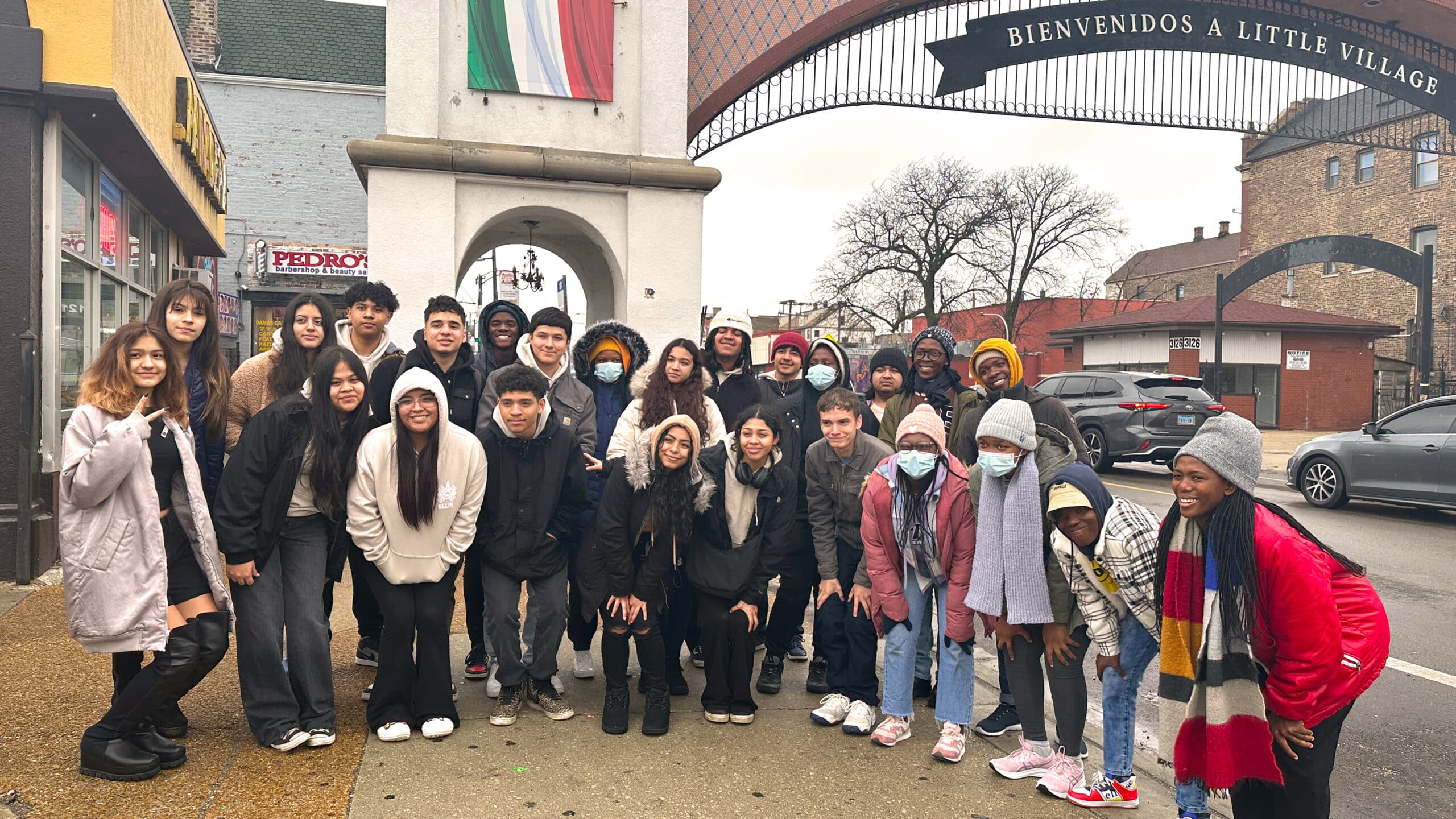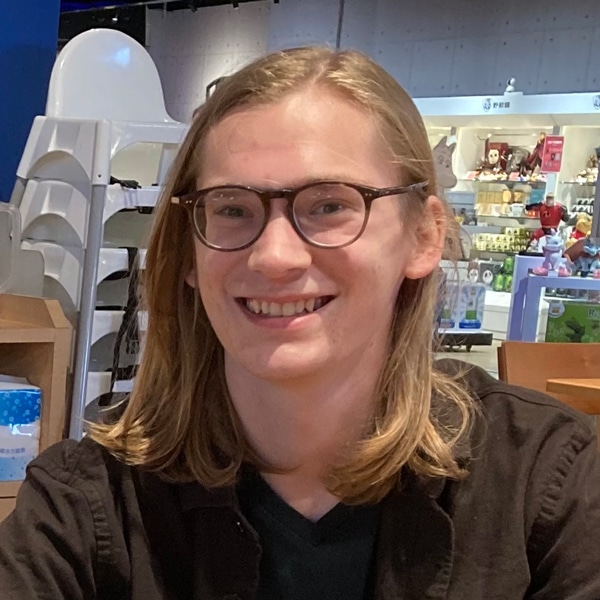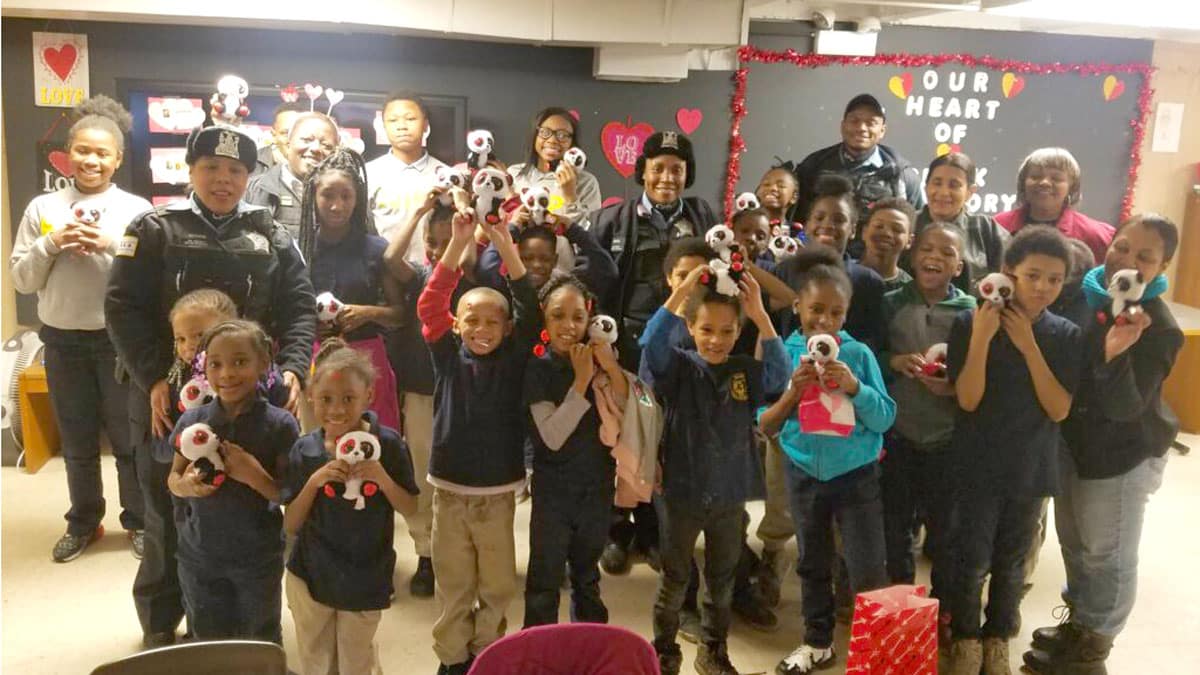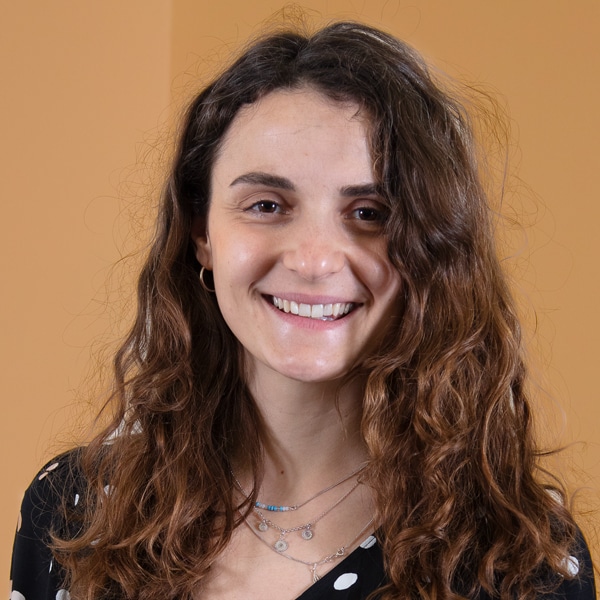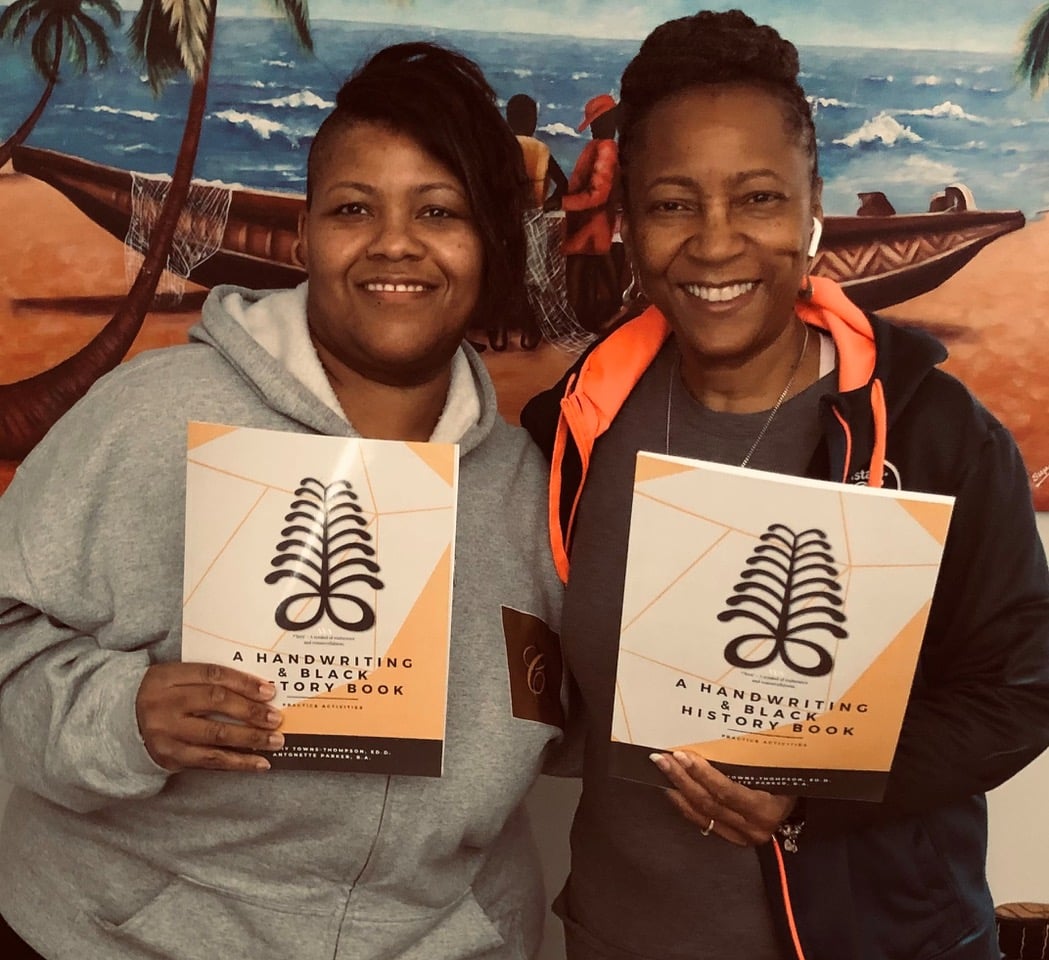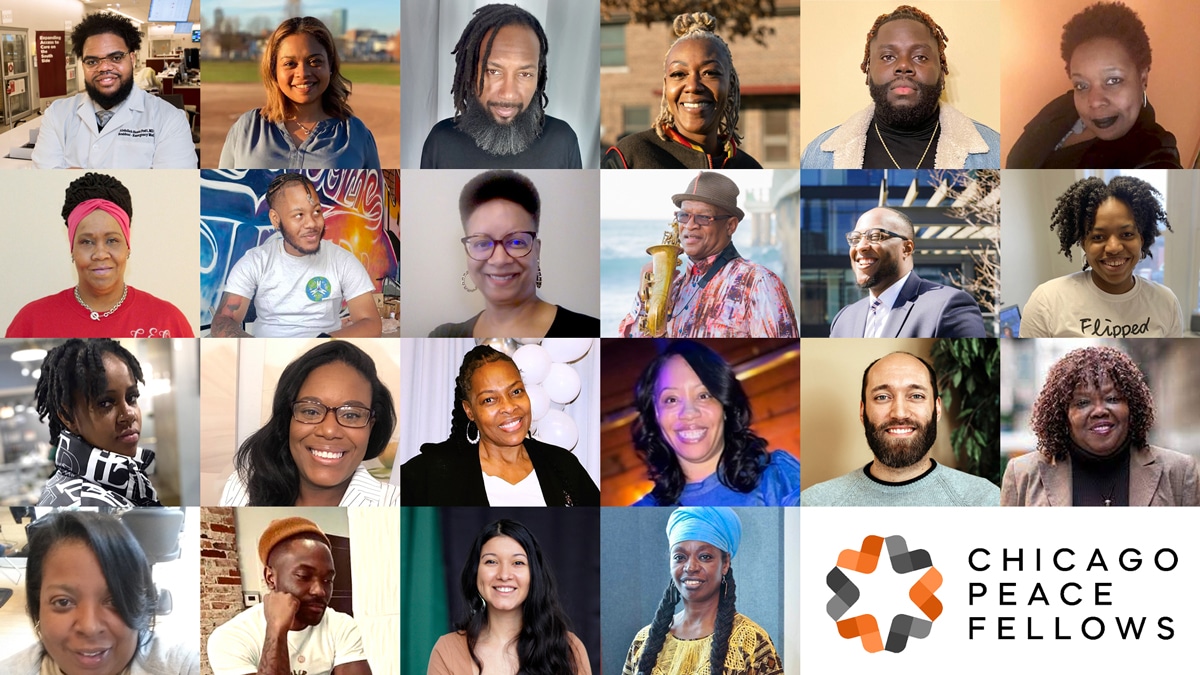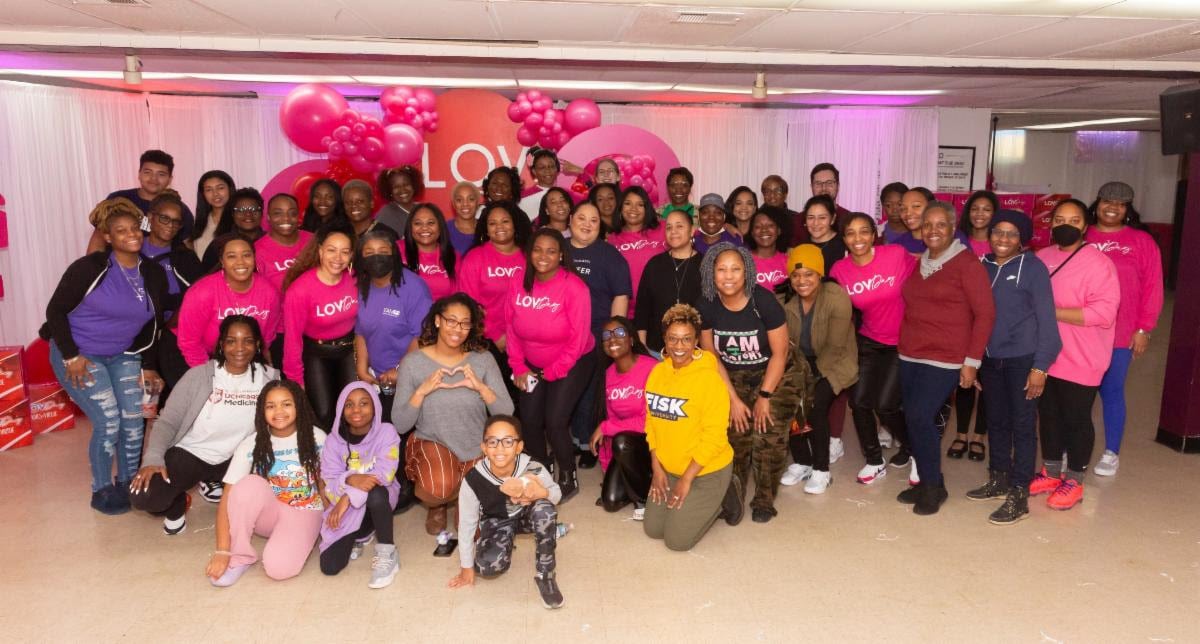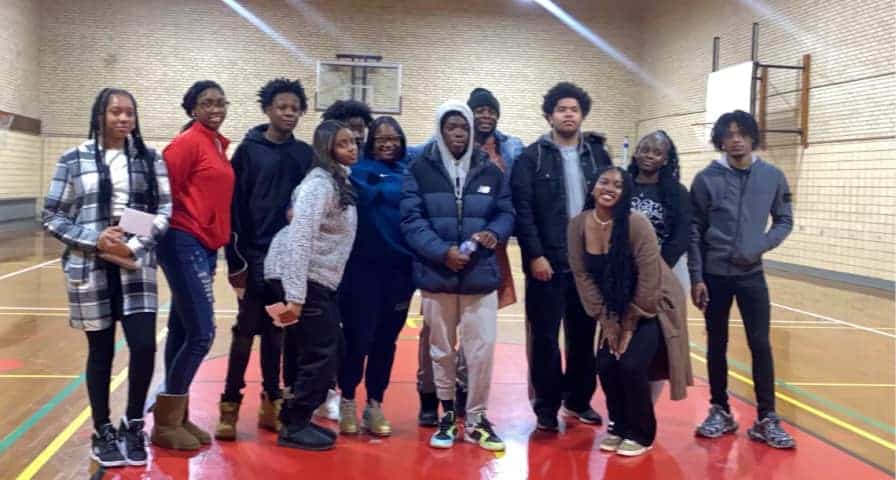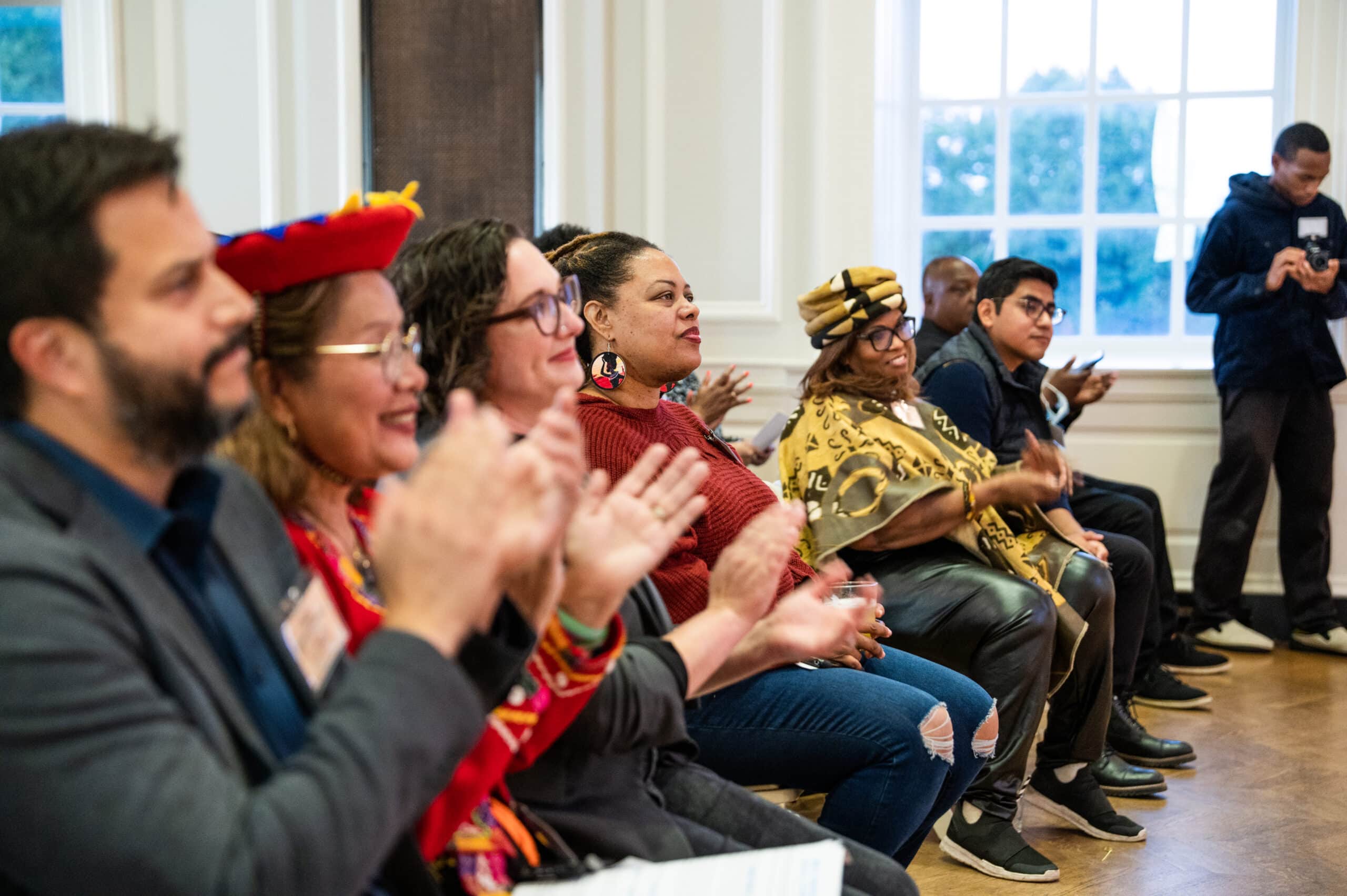Teaching the Importance of Pluralism and Social Inclusion through Robotics
By: Zeki Salah, Communications Associate
A global grassroots robotics initiative, One Team Two Continents, brought thirteen South African students to Chicago in March to participate in a FIRST robotics competition. The project was a joint collaboration between 2019 Chicago Peace Fellow Jackie Moore and 2018 Global Fellow Dieudonne Anumbosi Allo. Funding from the Chicago Peace Fellows Mutual Aid Collaborative and the U.S. Embassy in South Africa enabled the team to provide cultural programming and transportation for the South African students as well as their Chicago robotics team mates.
The Mutual Aid Collaborative consists of 74 Black and Brown leaders and committed allies who live and work in the communities they serve on the South and West sides. They have raised over $100,000 to support several active projects. As an expression of solidarity and support, The Funders Pledge, a project of the Mutual Aid Collaborative, decided to share their funding with the One Team Two Continents team to help cover the local costs of hosting the students.
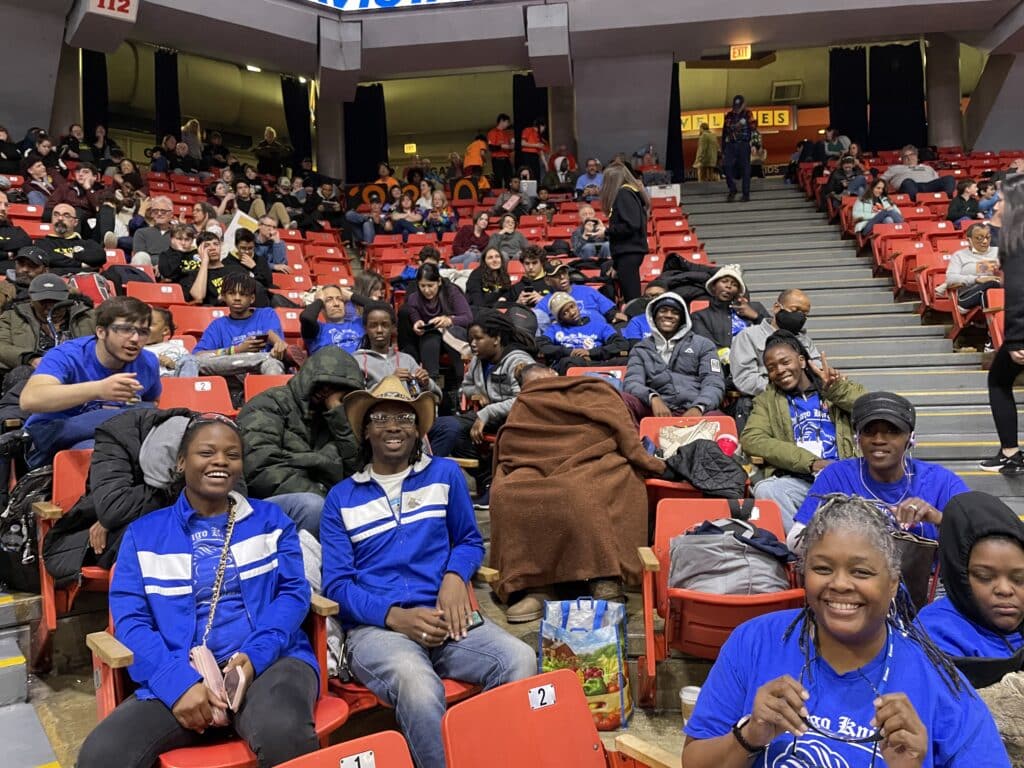
Both Jackie and Dieudonne have experience working with youth in STEM education, making them strong collaborative partners. Dieudonne is the CEO of the Global Leading Light Initiative, a non-profit in South Africa which supports young people in historically disadvantaged communities to acquire future proof skills, with the aim of reducing poverty and inequalities. Jackie is the founder and Executive Director of Agape Werks, Inc, a community based non-profit in Chicago with a mission to promote in young people an appreciation of math, science, technology, and engineering as strategic tools for success regardless of life circumstances.
The partnership between the students in Chicago and Port Alfred dates back to 2019, when Allo and Moore developed the “One Team Two Continents” concept after meeting through the Goldin Global Fellows program to explore cross-continental collaboration opportunities. This initiative envisions a youth-led, distributed team working together on robotics projects in an environment that fosters inclusion and cultural pluralism. The students from both continents convened under the banner of the Chicago Knights, a community based, borderless, and inclusive all-city FIRST Robotics team.
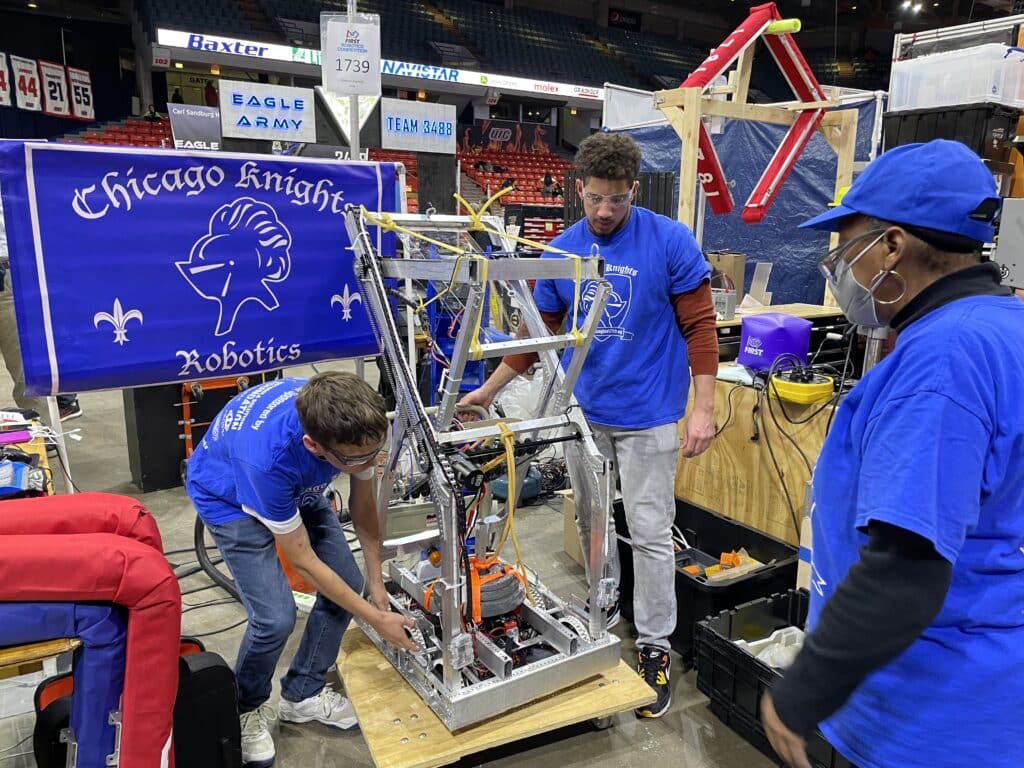
Prior to collaborating with Dieudonne, Jackie had been invited a few times to teach robotics in Uganda and South Africa. These opportunities did not meet her philosophy of teaching, which is to “not to become the expert in the room, but to work collaboratively with someone.”
Soon after Jackie and Dieudonne met, the pandemic hit and remote learning opportunities allowed for the students from South Africa to be involved in collaborative robotics programs. They collaborated remotely for an entire season of robotics competitions. Remote work did have its challenges, Jackie explains, “the way that I typically work really requires a lot of hand-on teaching.” While the virtual environment made it difficult for students to focus, especially in Port Alfred where they often faced the challenge of unstable internet connections and recurring “load shedding”, the students held on and kept coming back for robotics opportunities.
Things changed for the One Team Two Continents team when a grant from the U.S. Embassy's U.S. Mission to South Africa provided funding for students to travel between Chicago and Port Alfred. When applying for the grant, Jackie and Diedonne focused strongly on the fact that the kids from South Africa and Chicago would be working together as one team. Their project proposed to demonstrate the value of pluralism and social inclusion in a robotics environment. This allowed for the teens’ interest in robotics to be placed front and center while showing the value of pluralism and social inclusion through working together as a team.
The exchange between the students in Chicago and the students in Port Alfred went both ways, with the Chicago students having an opportunity to visit South Africa in October of 2022. Together the teammates built small robots and did exercises to develop capacity for working cohesively as a team.
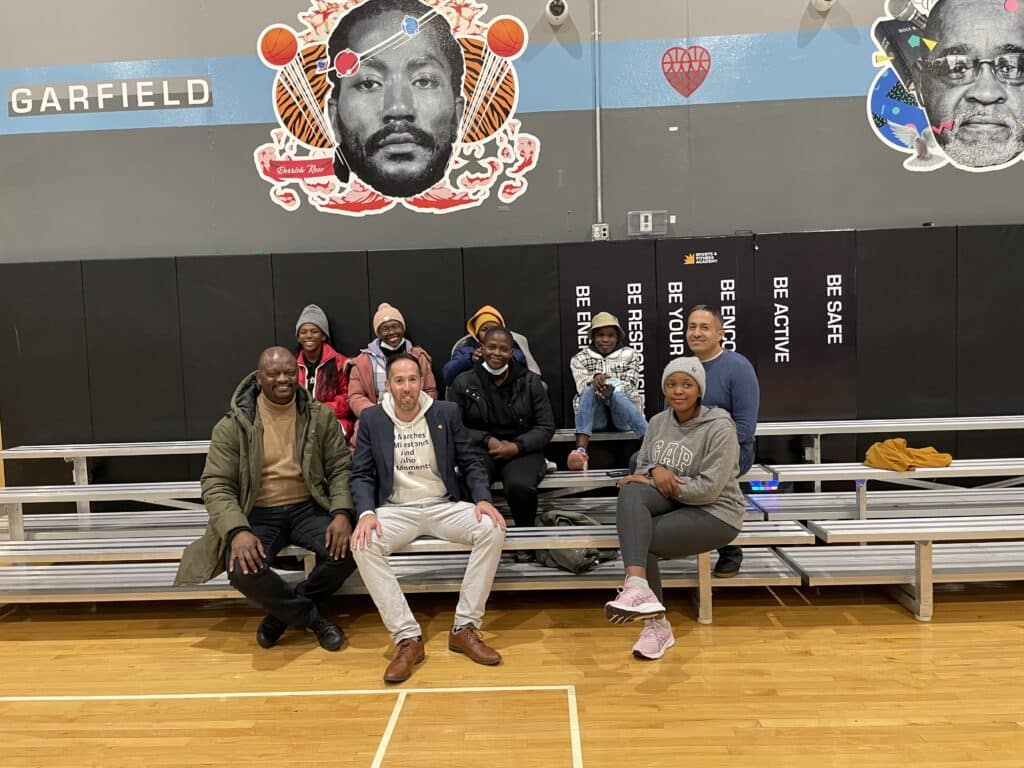
In one meaningful team building exercise, students were able to explore principles and practices of successful collaboration through a soccer game where the rules were altered to reflect the FIRST ecosystem’s values of “coopertition” and “gracious professionalism.” “Coopertition” is the practice of competing cooperatively in which a person will help their competition because the better they both are, the more they can do. In the same vein of competitive compassion,“gracious professionalism” is the idea of competing to the best of one’s ability, but to do it with grace and kindness. These two values harmonize well with Jackie and Dieudonne’s goals of pluralism and social inclusion because they encourage each member of the team to assess one another compassionately so that they can cooperate and work to each members’ strengths.
When the South African teens visited, they were taken on cultural tours of Chicago. These tours included all members of the team and many Chicago members visited places they had never visited. Students went to Little Village, Chinatown, and Robert Lindblom Math & Science Academy in West Englewood. Many of the South African students were surprised to see English as a secondary language in these neighborhoods, with the majority of signs being in Spanish in Little Village or Chinese in Chinatown. This encounter was particularly shocking to the adult South African on the trip who experienced apartheid, when assimilation to a dominant culture was expected. To see distinct Hispanic and Chinese cultural identities existing within a diverse society, and being celebrated by the community as a whole, was a new perspective and an example of the successes of cultural pluralism.
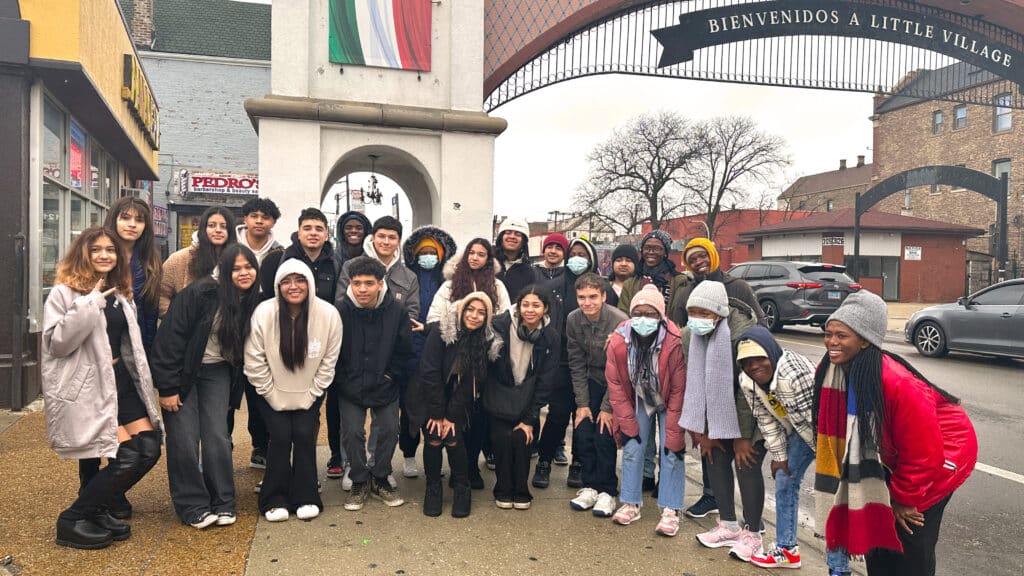
The teens who made up the Chicago Knights were incredibly dedicated to their team’s success, not only traveling internationally to learn robotics, but also sacrificing time from school and extracurriculars. The Chicago students missed Thursday and Friday for the competition, and a week of school to travel to South Africa in October. Hannah was a Chicago student who was new to the team this year. She was not able to travel to South Africa, but she worked consistently before and after the South African team arrived. For the competition, she took a break from her extracurricular activity of playing squash, missing a tournament to meet for robotics. This dedication to robotics helped the team members form close bonds and collaborate with one another and appreciate the diversity of the team.
The rules and guidelines for the FIRST Robotics competition came out in January, giving the team little time to build their robot in preparation. The 2022-2023 season of FIRST competitions was themed FIRST ENERGIZE, with activities encouraging the FIRST community to think about future energy sustainability. This challenge was inspired by the United Nations’ 7th Sustainable Development Goal, which is to ensure access to affordable, reliable, sustainable, and modern energy for all. The team built a mobile robot that was designed to play a custom game designed by FIRST. The robot uses a six-wheeled tank drive and is controlled remotely by a micro-controller called a roboRIO. It has an arm with a manipulator at the end which is composed of rollers that allow it to pick up and launch objects. The students built the entirety of the robot: interpreting drawings, measuring, cutting, drilling, and wiring electronics.
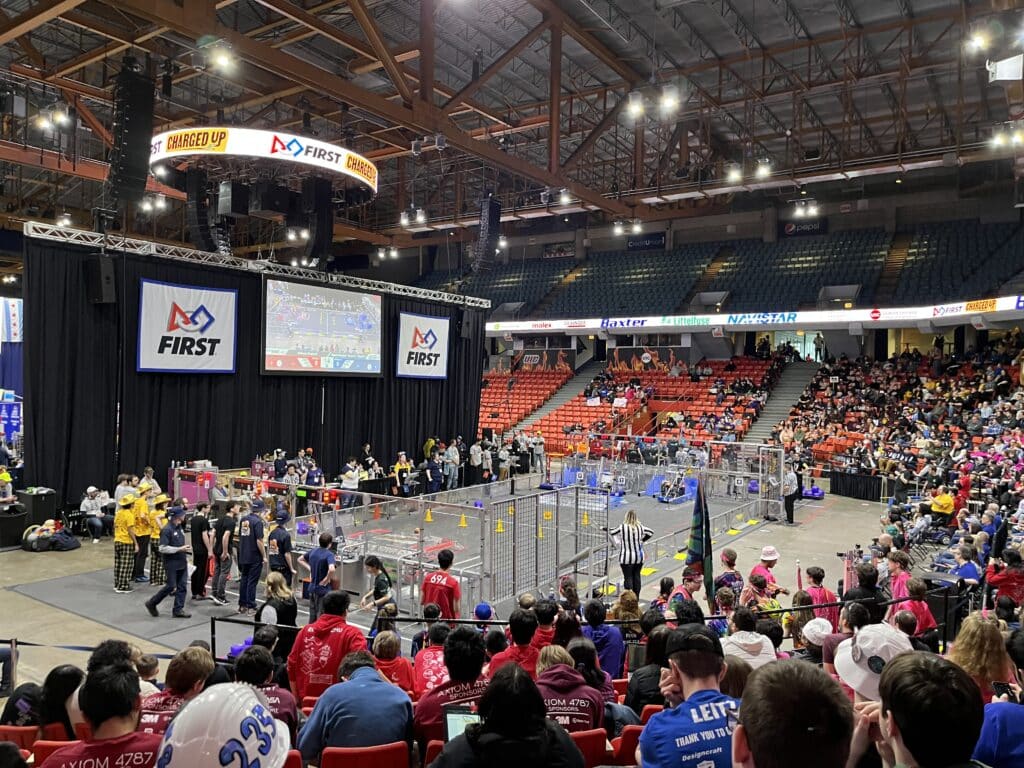
On the field were safety cones and inflatable spheres which needed to be gathered by the robots and moved to appropriate environments. Extra points could be achieved through creating links of particular objects within specific locations or by balancing the robot on an elevated platform with its teammates. Jackie and the Knights understood the game from a social perspective, referring to the manipulated objects as “cone people” and "square people” who could thrive by being placed together in diverse environments as a community which produces points as resources.
The team made an “Every-bot” design shared by the FIRST community which was designed to be accessible and constructible with basic tools. By focusing on the build, the team had a chance to get a lot of hands-on experience building by constructing the entirety of the robot in Chicago. The Chicago side of the team built an initial section of the robot, but when the South African students arrived they got to be a big part of finalizing the robot. Students learned skills and information on the sport to accomplish last-minute aspects of the build in the midst of the competition. One South African student named Litha came in without a great deal of hands-on experience but became a key member of the team working on electronics. She learned from mentors on the Knights and on other teams competing to gain the necessary skills to work on the electronics of the robot. Chicago students also stepped in to teach the South Africans what they had learned from prior builds. Reflecting on the process, Jackie noted, “I guess adversity builds strong bonds. We knew we had a deadline to meet, a very finite time to work on it, and they all worked together.”
Due to the timing of the South Africans arrivals and logistical challenges on the Chicago side, much of the building of the robot took place during the start of the competition. This came at the cost of missing the first day of competing, but provided bonding experiences and a lot of opportunities for the South African team members to gain the hand on building experience that they had been lacking. One student named Jalen, reflected on the building process: “We worked really hard. We would work from 9am-8pm because we had to build a whole robot in a week. We had to work quickly, make as few mistakes as we could, and stay focused.” Despite the rushed building process, the teens were very excited to participate in the competition and all came together to cheer when their robot made it to the competition floor.
As the teens on the Chicago Knights competed in the FIRST competition, they realized that cooperation was an essential part of the tournament. Many Chicago students went out of their way to teach South African students, who had limited experience building. For instance, Jalen was referred to as the “rivet master” for teaching the rest of the students how to use a rivet gun. Not only did teammates assist each other, but they were also helped by other teams. As the Knights crunched to build their robot, they were assisted by students from Lindblom to machine a ventilation pipe. Reflecting on her favorite memories working on the project, one student named Hannah reflected, “Cheering for our team at the competition was my favorite part. But we also got to go around and take pictures with other teams [...] I was shy to speak to other teams, but they were really nice and let me take pictures with them and their robots.” From start to finish, the FIRST competition was as much about compassion and collaboration as it was about competition, making it an excellent environment for cultural and intellectual exchange.
Spark Center: A New Community Resource Center for South Side Chicago
The community of South Side Chicago will soon have a new center serving them: Spark Center, thanks to the tireless contribution of Jennifer Maddox, Executive Director of Future Ties and 2020 Chicago Peace Fellow. Spark Center will hopefully open in 2024, at 6330 S. King Drive, and provide much-needed opportunities for residents in West Woodlawn, including social services and other engagement activities.
Jennifer says the Spark Center name itself will hopefully spark others to see that people need resources, accessibility to programming, and community engagement "in an area that was really one of the worst blocks of the city of Chicago."
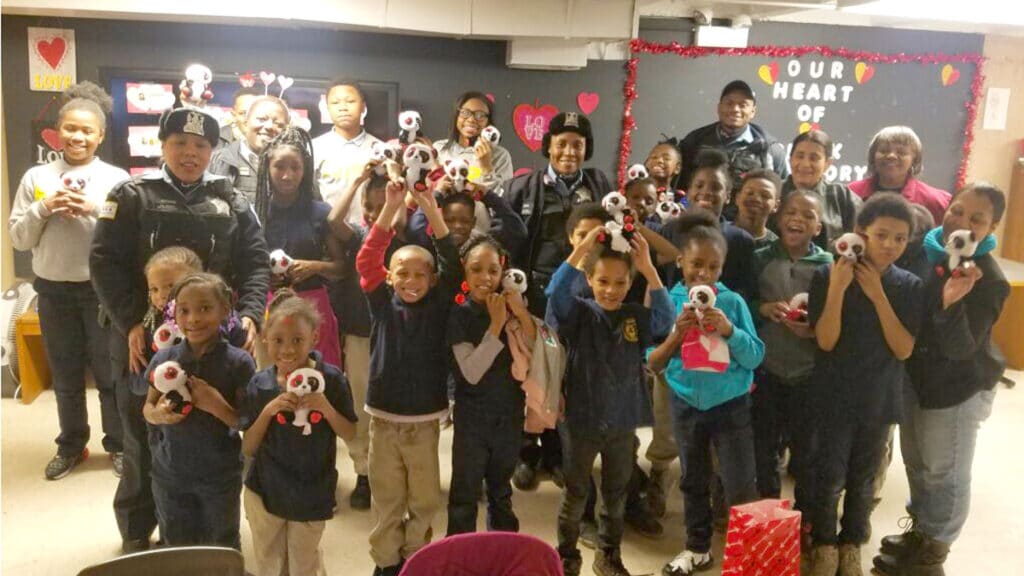
This is why Jennifer decided to establish the center, to attend to the community's vital needs and strengthen ties among young people and families in the area. The Spark Center will offer a range of programs, such as after-school clubs, workshops, assistance for parents, and a year-long program to build young people's capacity to engage in employment opportunities.
Broadening the Positive Impact on Community
The community has benefited from the work of Future Ties throughout the years, and things are only going to get better whereby they will touch even more lives with this center.
“In 2021, we got a donation from BODi to purchase a Walgreens building. Purchasing this building means we can expand our programming which is currently being offered in a basement, which means we are limited in what we can provide. Our new space will allow us to triple our programming. In the basement, we have to be very selective because we don't have a lot of space." --- Jennifer Maddox
Now, with more space and opportunities, she explains how the narrative can be rewritten for good.
"We want to change the narrative about the community because what we see happening over there is a lot of trauma, crime, disorder, and chaos. We want to alter that to show that families within communities are trying to be successful. Still, they need help and support."
Although they are still in the zoning process, she gives us a sneak peek of what families and youth can expect from a day spent in Spark Center.
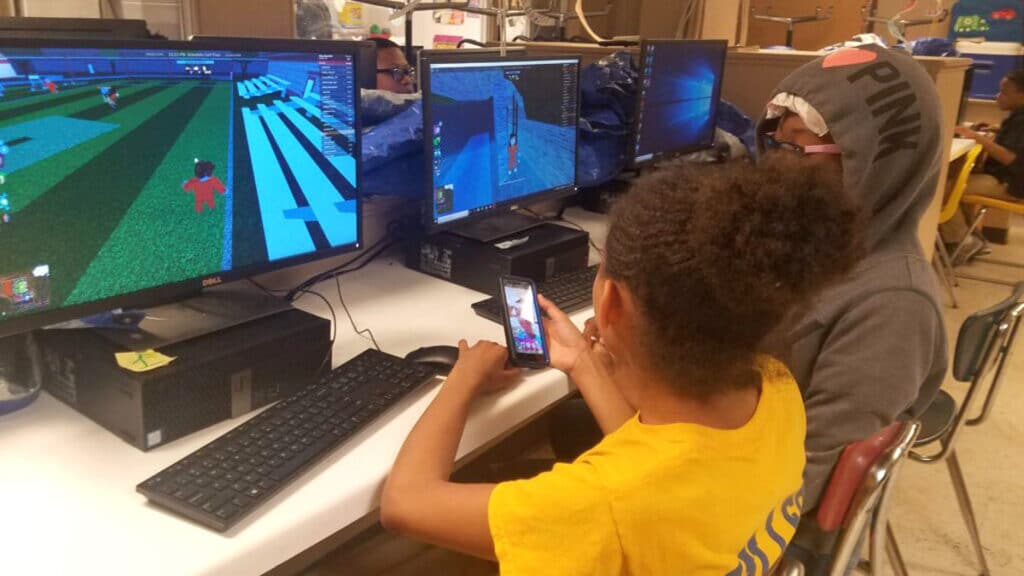
"Some of the programs that we offer are after-school programs. Typically, the neighborhood schools offer after-school programming, but they have over 700 students, so their capacities are limited. We get referrals from the schools and then do our community outreach to provide an after-school program. We offer an evening meal when they come in; they get a snack, they get help with their homework, if they have any issues with reading or something, we talk to their parents and see how we can help them."
Young people will also have a year-long program through which they can benefit.
"Here, we are building young people's capacities for employment opportunities. We provide training for resume building, interview skills, elevator teaching, and some soft skills they need to be job ready."
Speaking about the versatility of this center, Jennifer also elaborated on their plans to open a commercial kitchen.
"Once we build up the kitchen, it will also allow small businesses and entrepreneurs to use our space to get their brand out to people. It gets the community more engaged in what we are doing and contributes to building healthy eating habits among people."
A Community-Based Space
Jennifer believes such community-based initiatives are crucial for the well-being of that community. She elaborated further on the engagement process of the community:
“We had community meetings, and community members had the chance to ask questions about the program, about the design. They also spoke about what they wanted to see in this space. We considered all that and worked with our architect to see if things are in the way the community was saying."
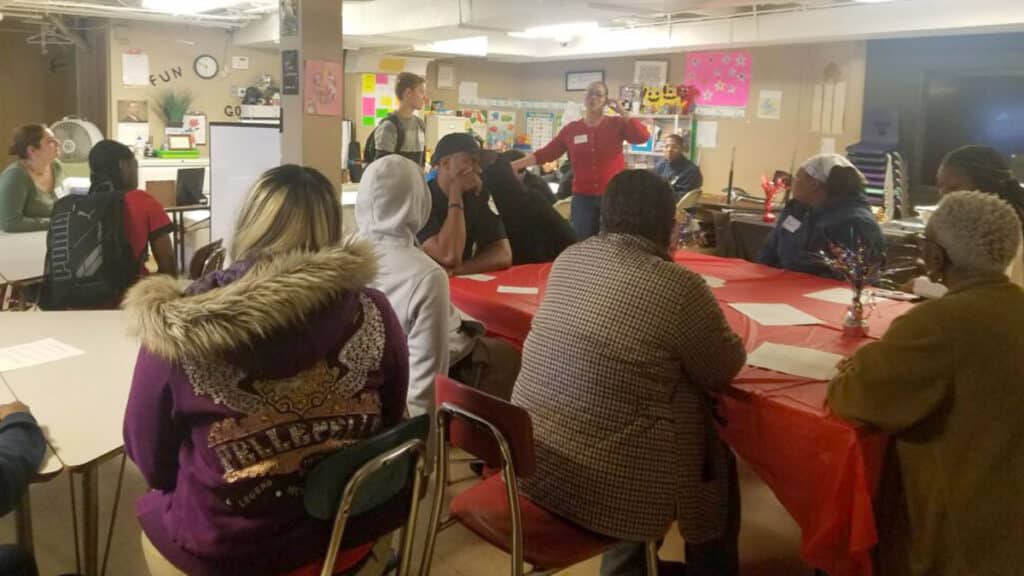
She adds that this space is for the community, and they are the ones utilizing it. She recalls that as a non-profit, they want people to see Spark Center as a place they can turn to which acknowledges them and meets their needs. For this, she understands that input from the community is vital in genuinely including and adjusting to its needs.
“We do not want a building that sits empty. We want people here. By this, we know that people in the building are using our services. We constantly wired the community. We have a flyer where people can scan a code, fill it out as a survey, and let us know what they think is working and what is not. They can also give us ideas on how they can be more engaged. We are always open to hearing new ideas.”
Building On Her Experience as a Chicago Peace Fellow
During our conversation, she touched on the importance of authentic community engagement:
"In the near future, I aim to have more parents included. We have a parent mentor program, where we work with parents and build their capacities to get them to see their best. Sometimes parents live through their children […].”
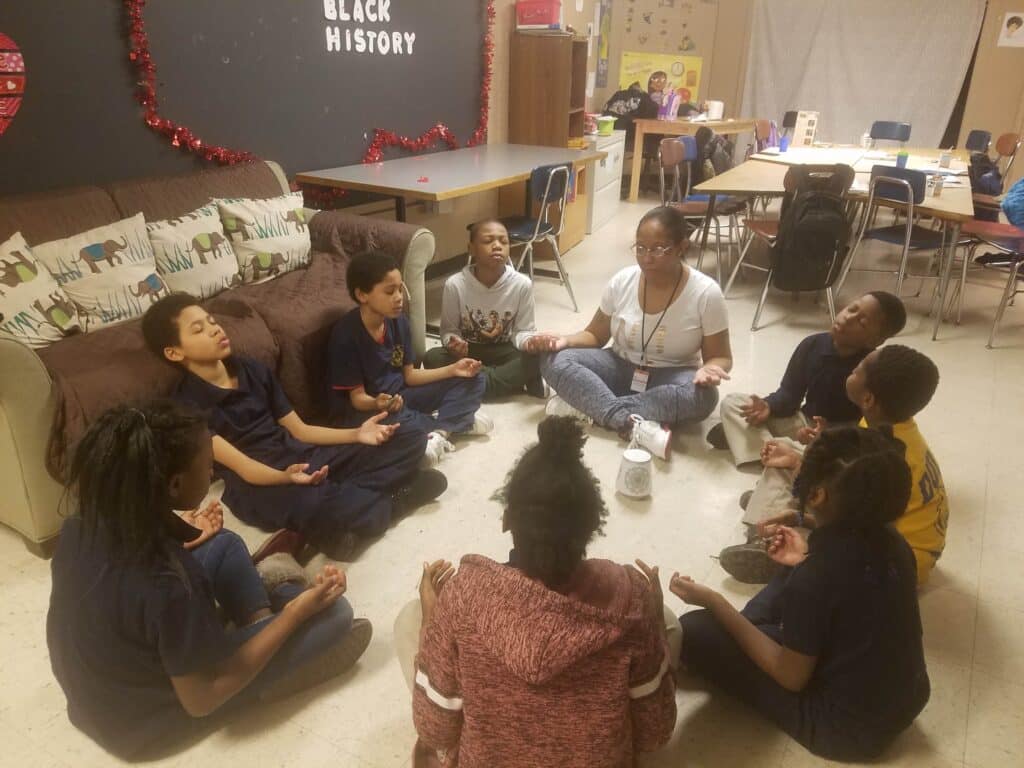
Speaking to parents, she adds "you are never too old to learn anything. We are supporting parents with their passions and things they wanted to do when they were younger."
Jennifer further explains that Spark Center has partnerships to help parents to get their high school diplomas, skills to be ready for a job, and driver’s licenses. And sometimes they also hire the parents and want them to be involved in the organization.
“Those simple things that people do not really think about are big to some of our parents, who never had someone to support them to get the things they wanted for themselves.”
When speaking about grassroots work, we could not leave aside her participation in the Chicago Peace Fellows Program in 2020.
“It was an honor to be a Peace Fellow because it made me feel I was not here alone. It made me feel that there are people across the city that were just as passionate and just as committed."
She adds that she loved listening to the other fellows' challenges and successes.
“They were so supportive of each other. It can make one have more connections; you have a whole cohort of Peace Fellows that you can call and say, ‘Do you know someone who does this or that?’ We want to know more about the work that others are doing. This is because to have peace and connectivity, we need to cooperate and spread the knowledge we have.”
Jennifer continues to implement her knowledge by dedicating herself to serving the community. As we wrapped up our interview, Jennifer shared that she is "just a woman trying to make a change in the community, coming from one service job, being a Chicago police officer for over 25 years, and now still maintaining a relationship with the community because that's the most important element to building trust."
She states the community needs change-agents that are credible and whom people trust and value.
***
If you would like to support the Spark Center’s cause, visit their website to volunteer, donate, or host your workshop.
You can also follow their work on social media:
A Reflection on Black History through Handwriting: An Interview with Dr. Dorothy Thompson
2021 Chicago Peace Fellow, Dr. Dorothy Towns-Thompson and her daughter, Antonette Parker, a teacher, recently co-authored three books on Black history and handwriting for children of all ages. Dr. Thompson has over three decades of experience as an educator, alcohol, and drug prevention professional, administrator, and ordained minister and has used the skills she acquired community activist and teacher to author these books.
The books cover arts, social studies, and social-emotional learning. They also include a motivational word for each letter of the alphabet, a definition or explanation of the word, and historical locations and personalities. The author also focuses on the importance of inter-generational connections and the need for communication within families and schools.
A unique aspect of these books is their spotlight on cursive writing and handwriting as a way of inscribing and honoring Black history. Dr. Thompson stresses that the books are not only a step further in bridging the educational gap in our society, but also inform future action-oriented strides.
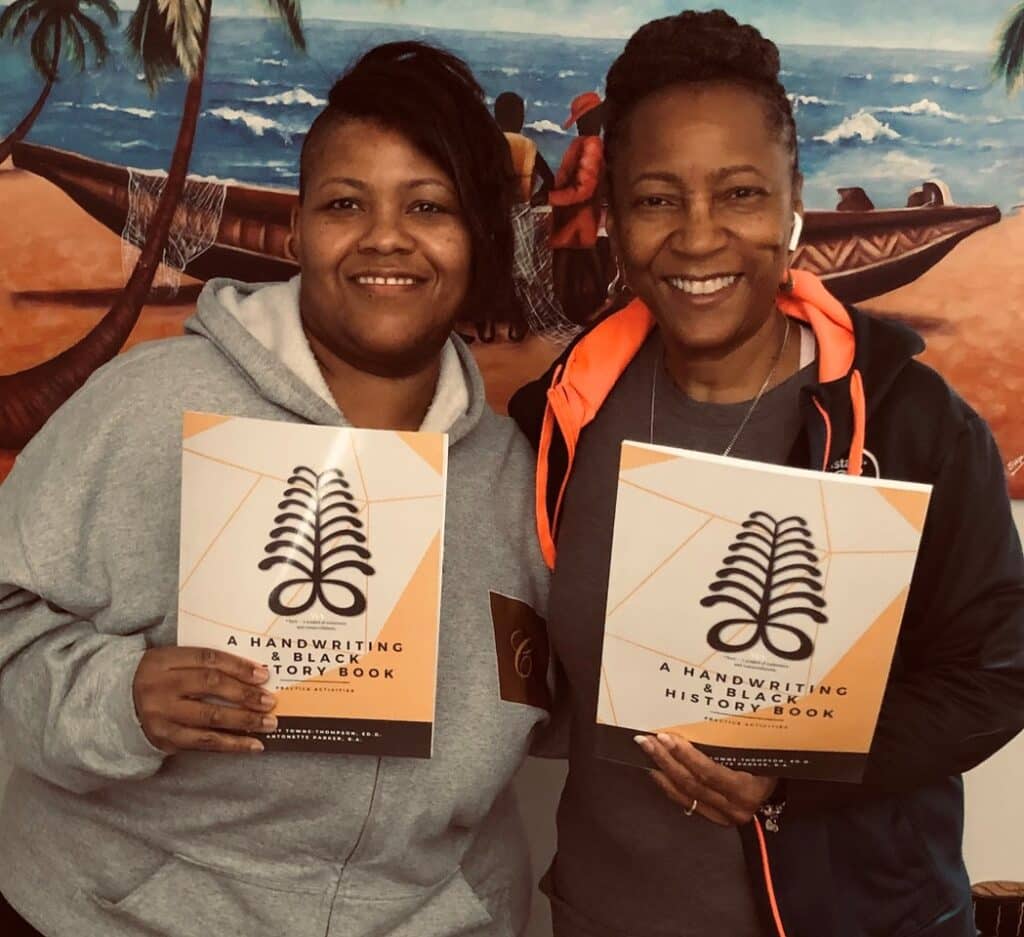
Flipping the Pages
The facts, photos, and biographies encourage youth to do more research on Black history once they read the books. Volumes 1, 2, and 3 of the books, released in February in connection with Black History Month, are for children of all ages, focusing on the experiences of Black people. "One reason I thought to write this is that I did not want just to have a book dealing with history or writing. My daughter and I also added inspirational messages. The book is divided into three volumes: primary, intermediate, and upper,” she elaborates. Each book cover has a distinctive color influenced by the Ghanaian Flag.
"The first Book is for primary students (Grades Pr. K - 2) and has a golden cover. It begins with “A stands for Africa,” with pictures on that page. It continues, “Africa is a continent, and America is a country.” We know that some children often cannot read books in the primary grades. Still, adults can read to them, drawing that emotional connection between the youth and adults." She adds, “The African diaspora spans from sea to sea and connect. And, through the books, people can see the connection. "There is also a sense of unity in this," Dr. Thompson added.
Book two is for intermediate students (Grades 3 - 5), and its color is green. It has the exact format followed by the book one, but the handwriting practice is in cursive. "To me, there's a need to be able to use the pen and paper where students are learning cursive writing because many young people don't know how to write in cursive. They have difficulty reading cursive." She shares that cursive writing is helpful to learn because it not only helps younger people decipher others’ handwriting, but also it is usually helps them to write a little faster.
The third book is burnt orange, representing the red of the Ghanaian flag. Dr. Thompson explains that "This book serves students in upper grades or higher (6 and up), and each letter of the alphabet includes two noteworthy historical figures." She further talks about how they chose specific people from the Black community while considering the goal of increasing connectedness and celebrating accomplishments: "You have famous Black people that people heard about like Dr. Martin Luther King, or Jennifer Hudson and George Foreman. But we also have people who were in art, or who were scientists. We have Eleanor Samuel, a scientist, and physicist. Or, the mathematician, Walter Mosley. " Dr. Thompson explains that they wanted young people to see Black people who are historians, politicians, performers, and athletes too. "It varies. We picked different people who have contributed to the history of Black people." The inter-generational connections are vital to her; she says adding they want to keep it going.
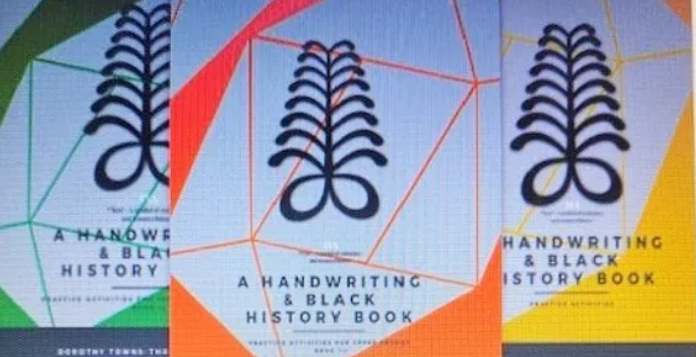
A Better Understanding of Black History
Dr. Thompson and her daughter also reflected on the relationship of their books with Black history overall when writing them. “A lot of times, young people, sometimes even people in general, do not see the connection between the relationship of Africans and African Americans. [...]. Because of the history and slavery, and how we represent people from different parts of the world and continents."
Dr. Thompson designed her books to highlight the need for people to see the rich history and how Africans and people from the African diaspora contributed not only to America but to various places worldwide. "Many times, young people and other people just see the negatives of Black people. That is why I say the book is not just for Black children, our children, or people in general. It's just to show that contributions have been made and continue to be made by Black people." She believes that having opportunities for communication within families or even in schools is so important. "I do not see my book only being used in schools. I see my book also part of family relationships." she adds.
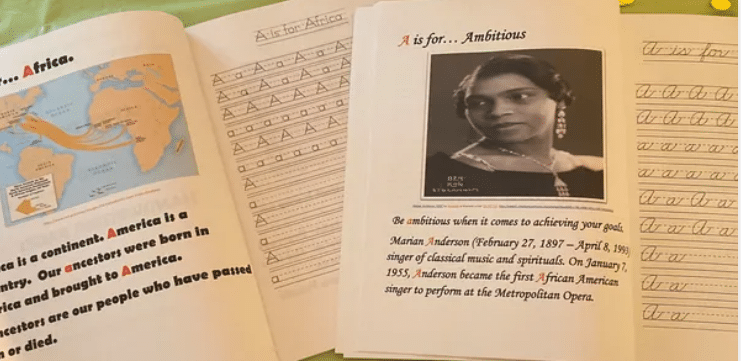
The Meaningful Mother-Daughter Cooperation
Dr. Thompson and her daughter Antonette adopted a division of labor concept as they collaborated on the book. "We selected different portions of what part of the book we wanted to manage. And then we came together to see what worked, what we should include, and how it should be shaped." She emphasized her daughter’s work as a primary school teacher aided in their ability to communicate and collaborate as they both have experience working as educators. Further, she adds that this will not be their last cooperation. "Since we are focusing on anti-bullying, that's one of the things that we are looking at creating a book for. We were ironing out some ideas. It would be another collaborative work."
Check out their website for book signings and more on A Handwriting and Black History Book.
Meet the 2023 Chicago Peace Fellows
by Travis Rejman, Executive Director
The Goldin Institute invites you to learn about each of our 2023 Chicago Peace Fellows representing 14 community areas across the city. Founded in 2019 in collaboration with the Partnership for Safe and Peaceful Communities, the Chicago Peace Fellows program is the only leadership development program that is built by and for grassroots community leaders on the South and West sides of Chicago.

ABOUT GATHER
Peace Fellows participate in GATHER, an online asset-based community engagement course, as well as in-person training, collaborative action projects, and networking experiences with civic leaders, academic researchers, and policy makers. The Chicago Peace Fellows reduce violence by building relationships, engaging youth, collaborative peace building projects over the summer and by creating new networks among residents, families, schools, and nonprofit organizations.
The Fellows are learning together through GATHER, which is both a mobile platform for shared learning and a curriculum for people who want to build on the talents of their neighbors and the assets of their communities to make real and lasting change. Gather Fellows learn and work together through an innovative curriculum that comes pre-loaded on a tablet device with all the connectivity, materials, videos, practices and tools necessary to provide a mobile classroom and toolkit for community leadership.
The Chicago Peace Fellows project connects and equips cohorts of past grantees of the Chicago Fund for Safe and Peaceful Communities to reduce violence and promote peace. The 2023 Chicago Peace Fellows is the fifth all-Chicago cohort to utilize the GATHER platform, an online learning hub built by the Goldin Institute to empower grassroots leaders.
The Chicago Peace Fellows will engage in a 22-week course of intensive shared learning as well as group projects, culminating in a graduation event in September 2022. The curriculum has been designed in collaboration with the grantees themselves, based on their practical knowledge and hard earned wisdom, with input from a wide range of civic leaders. Fellows will reflect on their past summer work, identify successes and lessons learned, and improve their abilities by sharing strengths and learning new skills.
The Goldin Institute and the Partnership for Safe and Peaceful Communities have aligned missions that value authentic community leadership. The Chicago Fund is uniquely effective at finding motivated problem-solvers and community-builders. By connecting Chicago leaders through GATHER, their efforts to nurture safer and more peaceful communities will be more effective, interconnected and lasting.
OUR PARTNERS
A special thanks to the Chicago Community Trust, the Conant Family Foundation, Crown Family Philanthropies, the Frankel Family Foundation, the MacArthur Foundation, the Polk Bros. Foundation, the Racial Justice Pooled Fund, the Seabury Family Foundation, and the Partnership for Safe and Peaceful Communities for making this program possible.
To follow along the learning journey with the Chicago Peace Fellows, please sign up for our newsletter and follow up on Twitter, Facebook and Instagram.
Black Star Project Showcases Careers in Sports at the NBA All-Star Weekend
By: Zeki Salah, Communications Associate
The Black Star Project recently partnered with BDM Sports & Education Project to send Chicago students to Salt Lake City to learn about careers in sports at the NBA All-Star Weekend from February 17-19. This trip marked the third year that the Black Star Project has sent young people to the NBA All-Star Weekend to provide them with an inside look at the professional world of basketball and with a fun weekend of basketball events.
Brian McCoy, or Coach Q, began the BDM Sports & Education Project in 2014 with the goal of making a positive difference on the South Side after repeatedly hearing about violence on the news. “What I know is that a young person can’t shoot a gun and a ball at the same time. So I went to one of the roughest spots in Chicago and said, ‘Hey, I want to do a free sports camp for young kids’ [...] I think the kids I spoke to felt my sincerity because I gave them a clipboard and when I returned later the clipboard was filled on both sides.” Coach Q then went to his contacts in community activism and education, including Gloria Smith, a 2020 Chicago Peace Fellow, and approached them about starting a youth sports camp, with a focus on the business side of sports. He held his first camp in Englewood in 2014 and has continued to hold basketball camps, baseball camps, and most recently an introduction to golf.
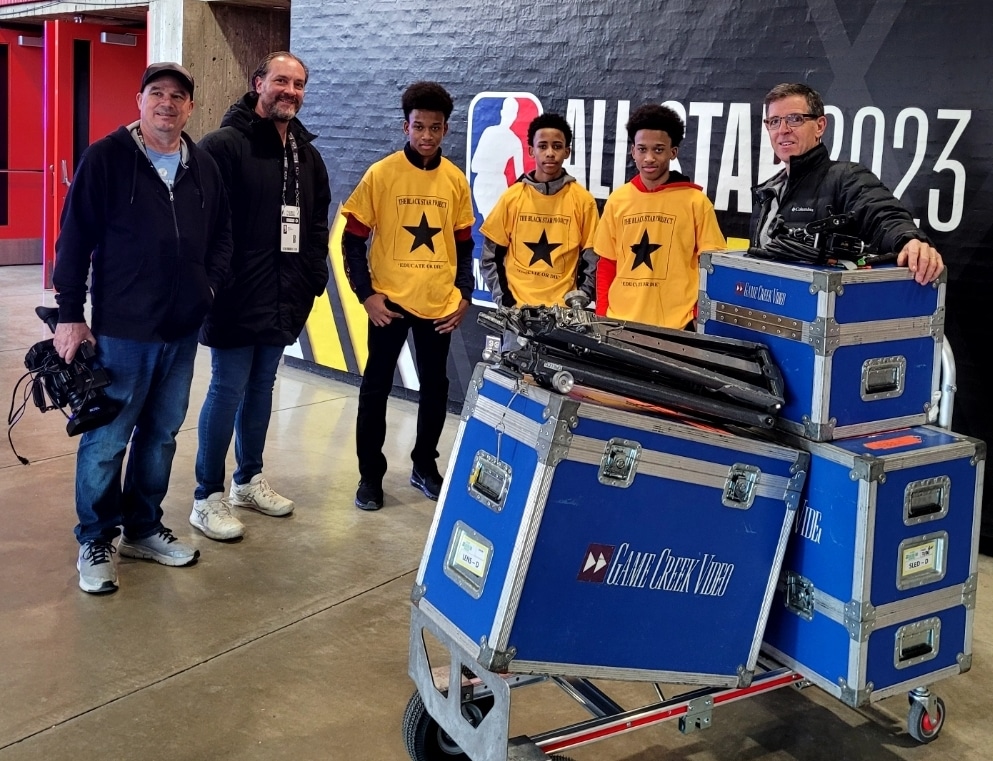
The trips to NBA All-Star Weekends have been held by Coach Q and the Black Star Project for the last three years. The trips aim to combine an introduction to the business of sports with a fun weekend for teens on the South Side. The trips place a focus on academics and include essay contests before and after the trip. In prior years, the Black Star project has chosen participants for the trips based on essays that they write on their interest in a career in sports. This year, an essay contest is being held for a cash prize following the trip. Coach Q and the Black Star Project also provide a ten week business of sports curriculum leading up to the trip, which allows the young people to learn about the different professions within the sports industry before they go on to meet them at events such as the All-Star Weekend. Speaking to the idea of synthesizing the business aspect and sports aspect of the trip, Coach Q said:
The average young person wants to be the next Lebron James, but in actuality, the probability is really slim [...] So, what I try to do is let them know that it’s okay to have dreams, but let them know the reality of the situation and ask: ‘What are you really looking for?’. By taking them to the game you can show them both sides, the excitement, but also the thousands of people making that game happen. There’s a camera man, a sports physician, a sports attorney, an agent, a sports statistician, a kinesiologist; there’s so many different careers involved that no one ever talks about.
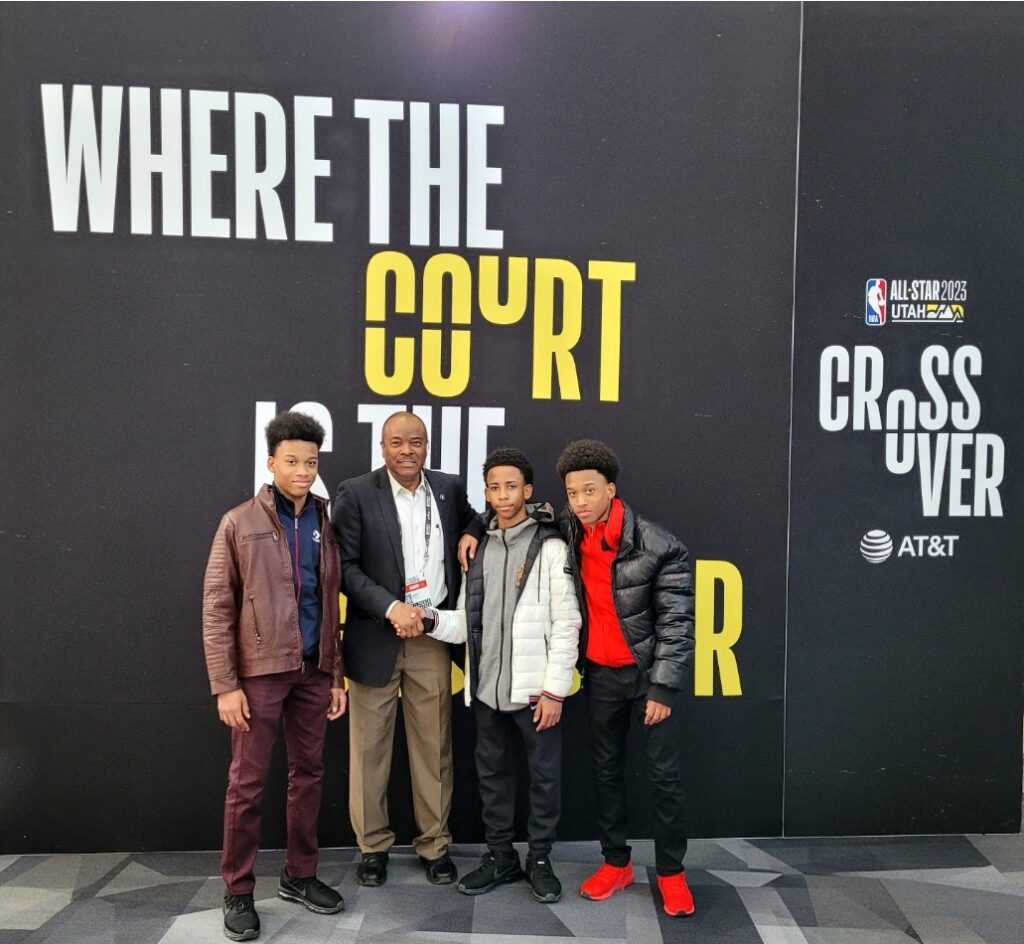
The Black Star Project took the lead on programming and fundraising for the All-Star weekend, while Coach Q accompanied the young people and introduced them to professionals in the sports business. The first event they attended was the HBCU Classic, an annual basketball game between two Historically Black Colleges and Universities (HBCUs) that was started by the NBA to show their commitment towards social justice in response to boycotts during the Black Lives Matter movement. The young people on the trip also participated in an HBCU college fair and learned about the NBA’s HBCU Fellowship program, which aims to provide career development opportunities in the business of basketball for undergraduate and graduate students from HBCUs. After the fair, the young people were also able to meet and greet with sports business professionals.
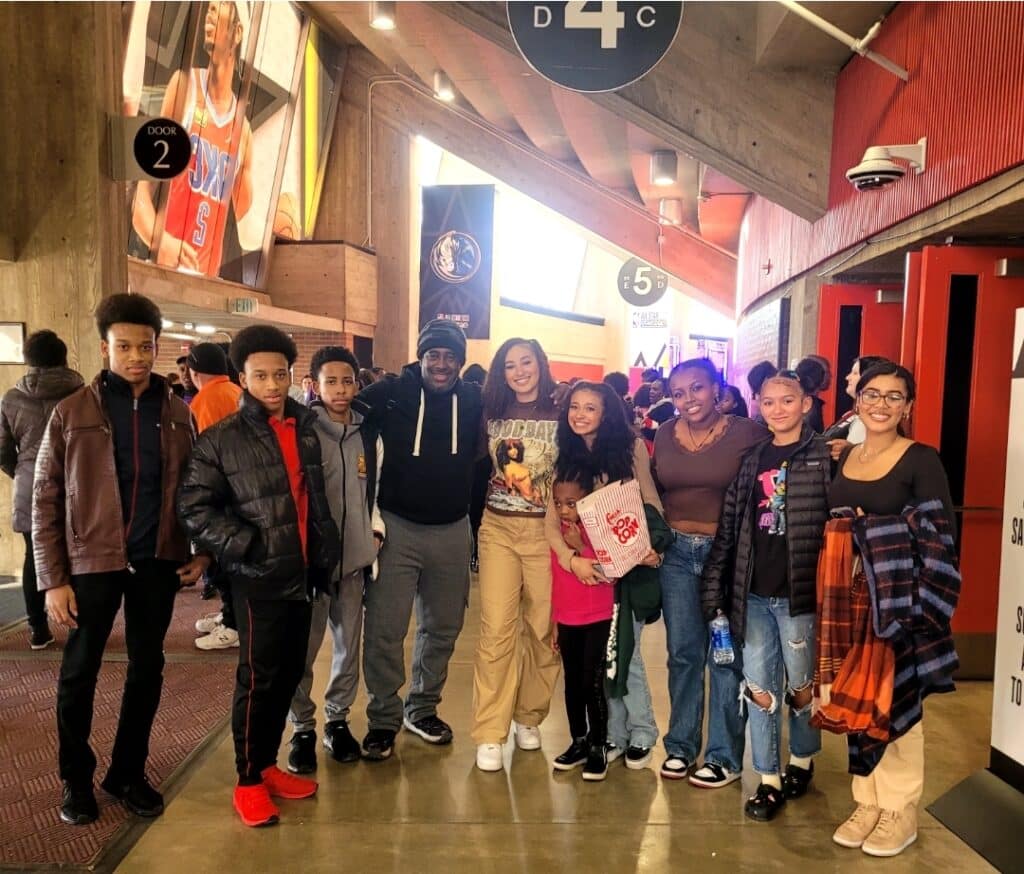
Throughout the weekend, programming combined both opportunities for the young people to have fun and enjoy basketball programming and an inside look into potential careers. The young people on the trip were able to have dinner with Rev. Jesse Jackson, who attended the University of Illinois on a football scholarship. He provided insight as to how entering the business of sports could allow an individual to transition to other careers, such as career as a minister and civil right leader. There was also a more leisurely section of the trip where the young people attended the NBA Crossover, which is a multi-day interactive fan event that brings basketball culture to the forefront, featuring player appearances, live performances, art, and music. Combining both business and pleasure helped the young people think about their futures in a fun and energetic setting and provided them with a one of a kind opportunity.
Coach Q and the Black Star project aim to continue to hold trips to NBA All-Star Weekends for young adults on the South Side. They hope to not only hold trips to the NBA All-Star games, but also to the WNBA All-Star games so that young women can get involved as well. The next WNBA All-Star game will be held in Las Vegas in July. You can support the Black Star Project and their efforts to send students to these games to learn about the business of sports here.
BDM Sports & Education Project's (Powered by the Black Star Project) 4th Annual Youth Business of Sports Essay Contest
Following the trip to Salt Lake City, BDM Sports and Education Project held an essay contest for high school students with the following prompt: "The average NBA playing career is about 5 years, how should players maximize their opportunities for personal growth and professional development, during their time playing in the league, while also preparing for when their NBA playing career comes to an end... Life Beyond the ball?"
Winners of the contest include:
1st Place Winner ($1,000): Brandon Williams-Orr, Providence St Mel HS
2nd Place Winner ($500): Aaron Williams-Orr, Providence St Mel HS
3rd Place Winners (Tied) ($250): Laylah Richmond, Bolingbrook HS and Antonio Scott, Little Black Pearl HS
LOV Day 2023 Instills Purpose, Passion, and Perseverance
By: Zeki Salah, Communications Associate
On Saturday, February 11th, 400 self-care boxes were distributed to 400 girls across the neighborhoods of Bronzeville, Englewood, North Lawndale, and Austin areas. The boxes were distributed by Ladies of Virtue as part of their 3rd annual celebration of LOV Day. LOV Day was sponsored by the Chicago Peace Fellows Mutual Aid Collaborative as a partnership between 2019 Chicago Peace Fellows, Jamila Trimuel, Executive Director of Ladies of Virtue, and Dawn Hodges, Executive Director of Imani Community Development Corporation. Ladies of Virtue is a Chicago-based non-profit founded by Jamila in 2011 with the goal of becoming the premier mentoring and leadership training organization for Black girls in the world. LOV Day was established in 2021 to further their mission “to instill purpose, passion, and perseverance in girls, ages 9 to 18, while preparing them for college, careers and to become change agents in their communities."
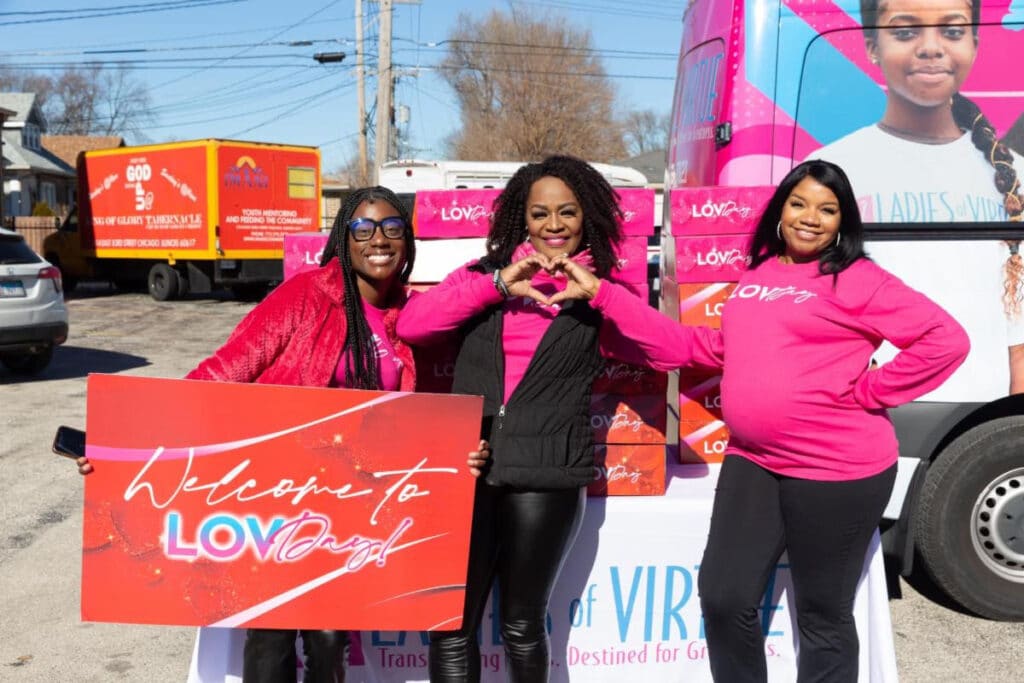
Ladies of Virtue is a mentoring and leadership program for girls, ages 9 to 18. Over the last 11 years they have served over 2,000 girls and families. LOV matches their participants with mentors and prepares them for leadership through our culturally relevant character building, career readiness and civic engagement curriculum. The team at Ladies of Virtue provides project management, collaboration and communication training via their two to four-month project experiences to empower girls to lead in the modern workforce. After graduating from high school, with successful completion of LOV’s leadership program, participants are mentored and supported for six additional years, from 18 to 24, as LOV 4 Life alumni.
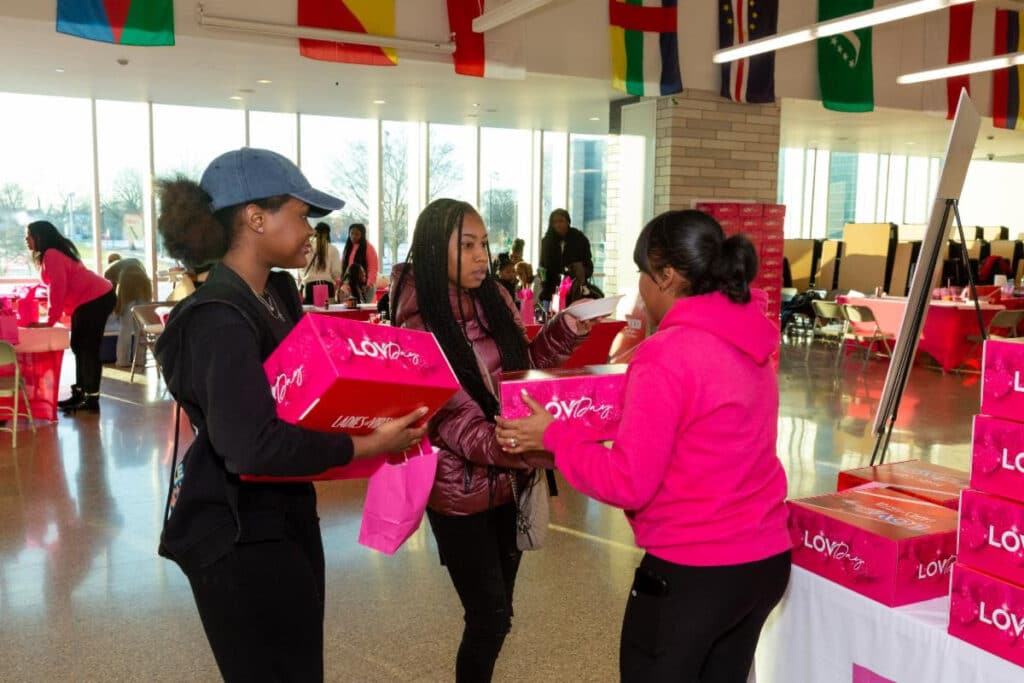
LOV Day was a community effort, obtaining funding from the Peace Fellows Mutual Aid Collaborative, drawing in fifty-five volunteers from 12 Corporate/Community Partners, and hosting events in six different schools and community centers. Jamila brought the proposal to fund LOV Day to the Mutual Aid Collaborative alongside 2019 Peace Fellow, Dawn Hodges.
The Mutual Aid Collaborative consists of 74 Black and Brown leaders and committed allies who live and work in the communities they serve on the South and West sides. They have raised over $100,000 to support several active projects. The Mutual Aid Collaborative met and collaboratively voted in January to provide LOV Day with funding to support the distribution of LOV Boxes filled with self-care items. Each LOV box included a teddy bear, chocolates and candy, a painting kit, hair care products, and Black history facts.
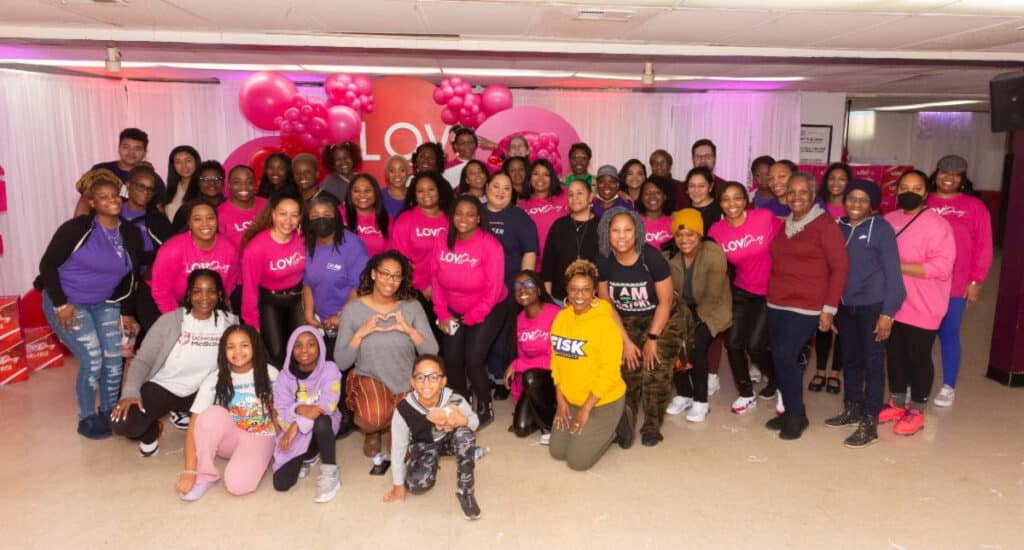
LOV Day served as a way to celebrate both Black History Month and Valentine's Day. Themes of Black history and culture were interwoven with the idea of providing girls with the space and opportunity to rest and care for themselves. LOV Day featured a self-care experience called “Black Girls Rest”. This event served 100 girls, twice as many as the previous year. Black Girls Rest included workshops on how to maintain healthy hair, skin care, and feminine care. Hair care stylists, cosmetologists, aestheticians, and an OBGYN all attended to provide guidance. Speaking to the themes of Black history and rest, one Lady of Virtue stated, ”All throughout Black history, slavery and during the Great Migration, Black people were constantly on the move and still to this day heavily dipped in GRIND culture. We need to STOP and REST.”
While 2022’s LOV Day centered more around the distribution of boxes, this year’s LOV Day focused heavily on programming, with Ladies of Virtue visiting six schools to hold self esteem and confidence workshops. Events include hair and makeup demonstrations, pillow decorating, mental health workshops, feminine and skin care tips, and candle making. The programs were conducted by program facilitators for the Ladies of Virtue and aimed to show Black Girls that they are and should be loved, nurtured, and protected. For instance, one workshop had girls identify what they love about themselves and encouraged their peers to support that expression of self-love.
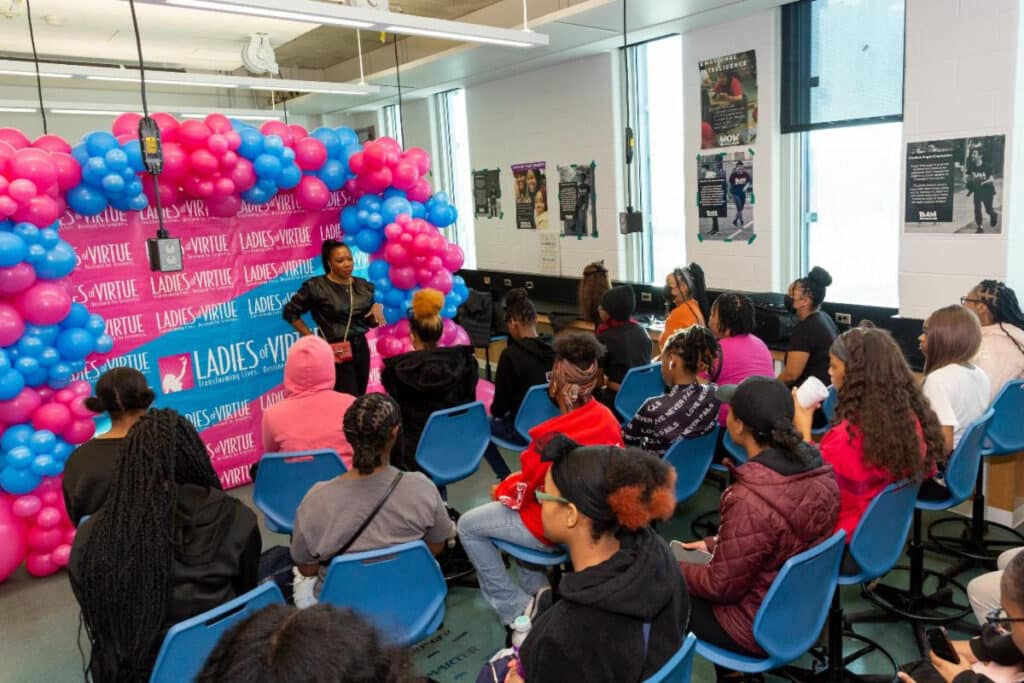
Jamila attended one of the LOV Day classes where girls were discussing when they were at their best. One girl that Jamila was working with said “Oh I love my smell because it reminds me of how my dad smells,” but then noted “ I really don’t talk about my dad much.” When Jamila asked why, the girl mentioned that he died a few weeks ago. Jamila reflected, “that really let me know that she felt like this was a safe space for her to express herself; that we were establishing a safe space for girls to just be themselves.”
To continue their mission of instilling purpose, passion, and perseverance in girls, ages 9 to 18, while preparing them for college, careers and to become change agents in their communities, Ladies of Virtues is always looking for volunteers. Volunteers serve as role models for their girls, parents, and the community. You can find volunteering opportunities for LOV at: https://www.lovchicago.org/volunteer
Generation Now 2.0: A Mutual Aid Collaborative Talk Show for Teens Produced by Teens
By: Michael Henderson, Director, Mutual Aid Collaborative
Generation NOW was conceived by Messiah Equiano, a 2021 Chicago Peace Fellow, and aims to provide opportunities for young people to work on a teen talk show that addresses everyday issues that teenagers face. The program pays teenagers to produce, direct, and act in the show and provides them with a safe environment to express their thoughts.
In August of 2022 Generation NOW filmed its first talk show that addressed “Dating and Violence”. Messiah Equiano, Executive Director of CHI-Rise, and Nicole Davis, Executive Director of the Talk to Me Foundation, saw first hand how therapeutic and empowering this platform was for teens. They deemed the first filming of Generation NOW as a success and proposed a second talk show to the Chicago Peace Fellows Mutual Aid Collaborative.
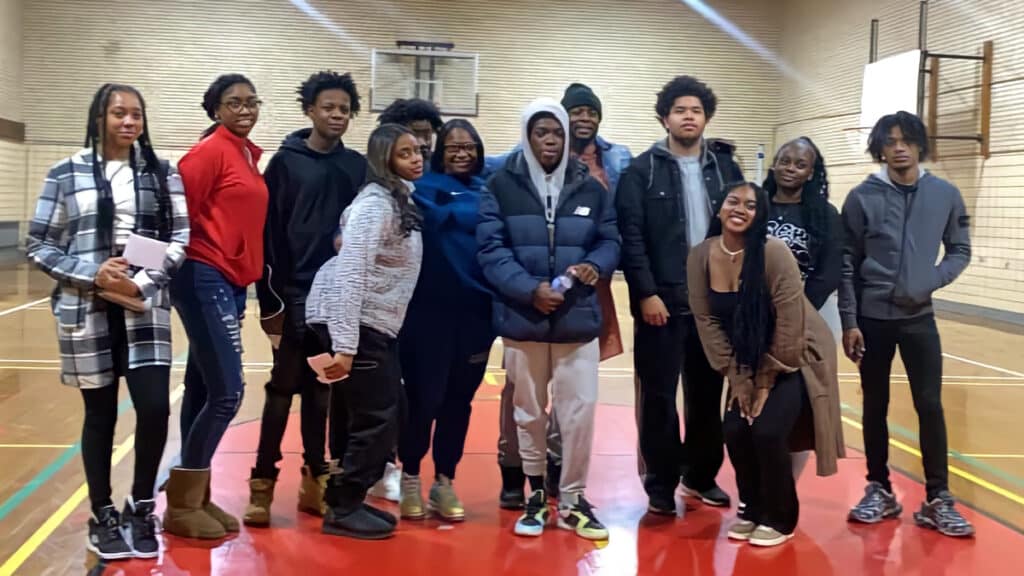
The Mutual Aid Collaborative consists of 74 Black and Brown leaders and committed allies who live and work in the communities they serve on the South and West sides. They have raised over $100,000 to support several active projects. The Mutual Aid Collaborative met and collaboratively voted to provide Generation NOW with the funding to film a second talk show at the Foster Park District.
Messiah and Nicole wanted to expand the dating conversation in the second filming and talk to teenagers about love. Nicole thought “Keeping with February as the month of Love and with so many young men and women at the ages of 12 and 13 dating, Generation NOW wanted to know what love looks like to them”. On Saturday, February 4, 2023 Generation NOW filmed a talk show focusing on young peoples’ understanding of love entitled “The Love Recording”.
Continuing the vision of the first talk show. Generation NOW provided young people with a safe setting to be open about their opinions, while also providing them with experience with different aspects of television production. Teens work on the project as writers, production members, or actors and were compensated for their work. Funds provided by the Mutual Aid Collaborative were used to pay ten teenagers $250 each for their involvement in a day of filming.
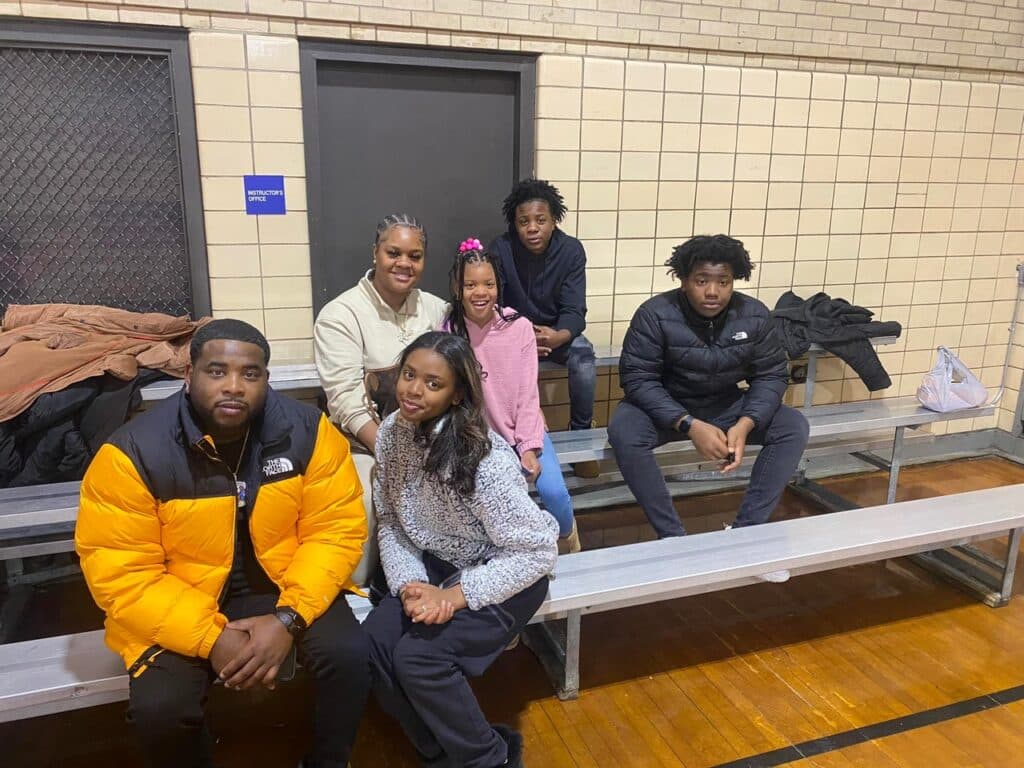
Messiah and Nicole agreed that teens are not always given the space to feel safe in the city of Chicago or in their homes and “it's ok to open up” and be vulnerable. The intimate and safe filming provided teens with a platform to voice their beliefs without judgment, but also with a chance to enact their visions in a production and to work together collaboratively. Each participating teen/young adult performed their expression of love through forms such as poems, monologues, and skits. Following the performances, discussions were held to explore the themes and messages of the show. The transparency and vulnerability of the answers according to the 25 plus attendees had the crowd “up in smoke”.
For one scenario performed at the “Love Recording,” young men and women were given flowers and candy to reenact how they will ask a person out for a date. The attendees were amazed at the vulnerability in the response and stories from the teens. The majority of the girls suggested that it's the responsibility of the guys to ask the girls out for a date, while some of the boys agreed that if a girl is asked out and has a boyfriend the girl should let the guy know. Another vulnerable teen shared his experience and story of being assaulted by a girlfriend. These stories allowed the teens to have open conversations about dating and the different kinds of expectations and responsibilities they feel in romantic life. The second filming was as successful as the first with both teens and parents participating with excitement.
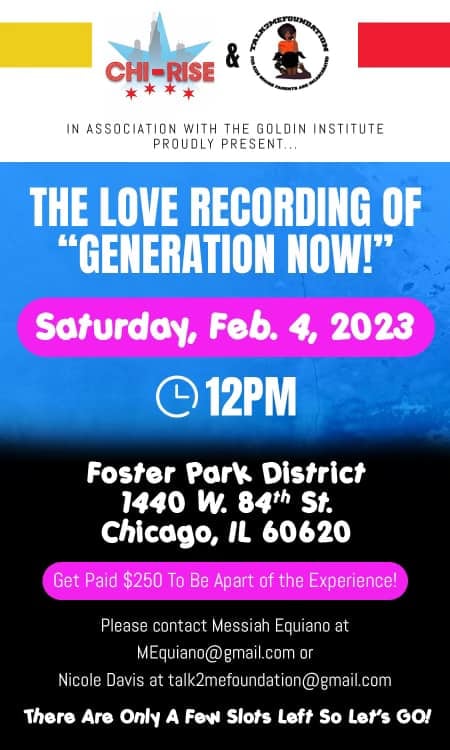
Generation NOW aims to provide teens with opportunities to express themselves. Messiah believes it's important to let teenagers know “they value their voices, they value their experiences, they value their input and their involvement in their communities”. CHI-Rise and the Talk to Me Foundation “want to give back” to their community and teens. They are looking to produce episodes of Generation NOW monthly. They are also looking towards expanding the programs to different communities, and looking specifically at communities with higher risks of violence and to get more parents involved.
A Look Back on 2022: a year of growth and strengthened solidarity around the globe
By Jassi K. Sandhar, Global Research Fellow
As we wind down the end of another year, I am amazed at how much we have achieved within our network and the strides we have made, both as individuals and as a collective. Our global network and partners continue to accelerate their efforts to attend to the most urgent and pressing needs of their communities. We witnessed increased levels of solidarity, more calls for positive action, strengthened collaborations and shared leadership. We end this year with 150 alumni (representing 40 countries) who have graduated from our Fellows Program and are now part of our wider network.
We have compiled a month-by-month timeline of the achievements of our grassroots leaders below. Despite some challenging times, our network continue to respond with compassion, empathy, and commitment to social justice. We end the year by thanking our dedicated supporters whose commitment made many of this year’s successes possible. We look forward to your continued support for community-driven social change in 2023!
January
We commemorated the 12th anniversary of the Haiti earthquake (which had a devastating and lasting impact on the country), by sharing an update on the current situation and launching our “Global Solidarity with Haiti campaign” to support our partners Daniel Tillias and Malya Villard-Appolon, who are on the frontlines responding to those most in need.
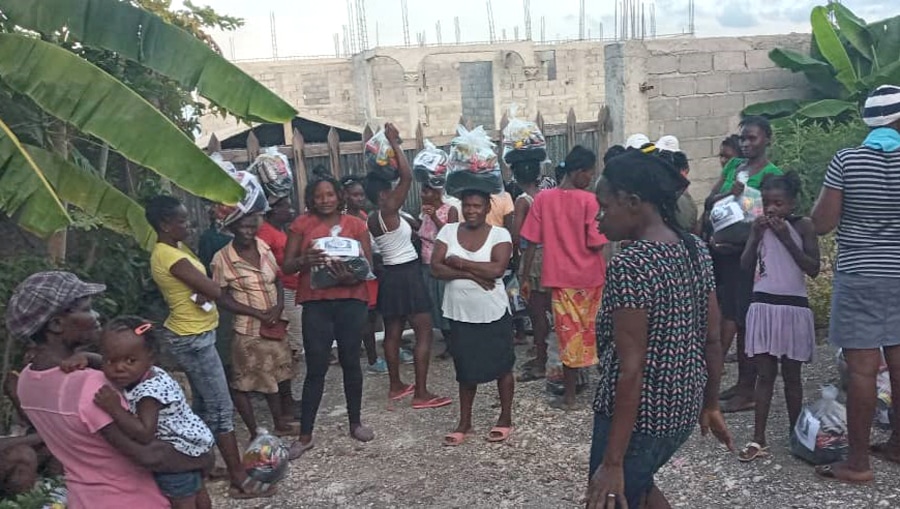
Our alumni in Liberia, Jennifer Henshaw, and her organization LEGAL which works to support the LGBT communities in the country, celebrated their 10th anniversary. Jennifer provides a reflection on their 10-year journey, including their long-standing achievements and ongoing challenges.
January was also a month of collaboration between our global partners. Our partners in the Philippines, Andy Alegre and Susana Salvador-Anayatin, joined forces to deliver urgent humanitarian relief to families following Typhoon Odette in the Philippines. Our 2021 Global Fellows Mathias Ngong Njoya (from Cameroon) and Gopal Iyer (from the UK) also collaborated to host a two-day workshop which brought together 30 youth from 15 countries in Africa and Asia. The workshop was designed to help and guide youth on professional development planning.
February
This month, our 2021 Global Fellows provided an update on their collective campaign; 24 grassroots leaders created a joint fundraising campaign to raise money to support their continued social change projects in their countries. Collectively they raised $12,000. John Kamma, 2021 Global Fellow from Liberia, used those funds to initiate a community clean-up day in Glass Factory community (which is an overpopulated but underserved community).
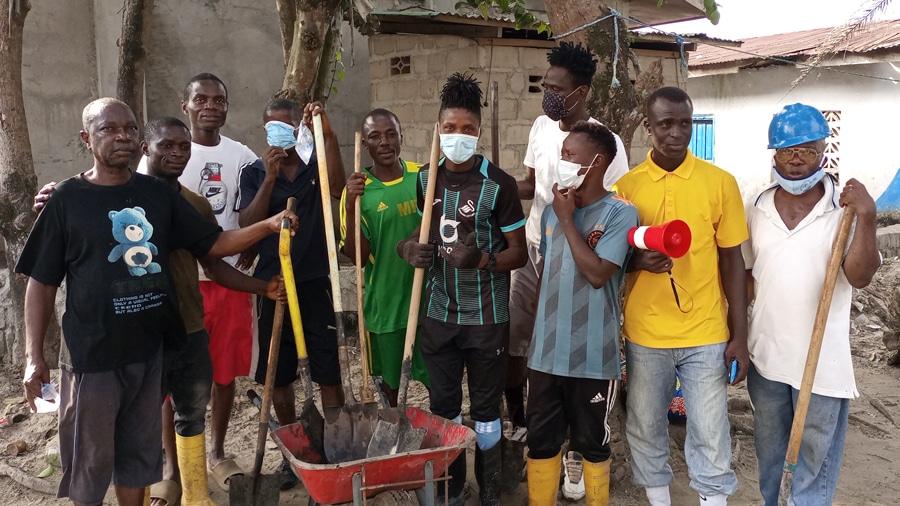
This month, the Chicago Peace Fellows Mutual Aid Collaborative also held a press conference on the anniversary of the assassination of Malcolm X to amplify the themes of their open letter, A Pathway to Anti-Racist Philanthropy.
2021 Global Fellow from The Philippines, Andy Alegre, commemorated International Day of Prayer and Awareness Against Human Trafficking by organizing an online prayer session together with churches and various organizations using a special vigil of prayer specific to this event. This month, Chicago Peace Fellow Jamila Trimuel’s organization also hosted their annual LOV Day, a day dedicated to “show love to our Black girls!”.
March
We welcomed our 2022 Chicago Peace Fellows! 14 grassroots leaders representing 14 different communities across Chicago joined the Fellows program to learn, share, and collaborate together as a Community of Practice.
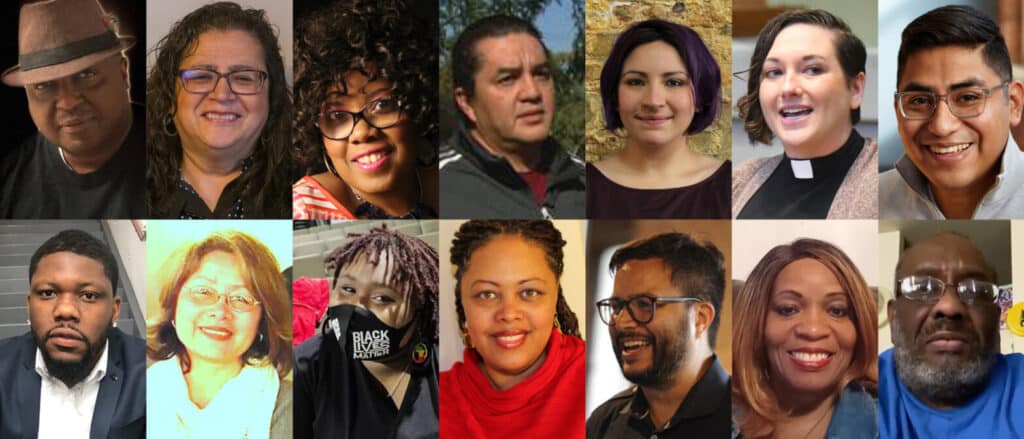
Our 2021 graduates of the Chicago Peace Fellows Program also organized and enjoyed a retreat, to collaboratively focus on rest, restoration and reflection in beautiful surroundings and to strengthen the bonds between them.
We also saw collaborations between DePaul University (Chicago) and Global Fellow Berry Behr (South Africa) which helped document oral history testimonies to capture the interfaith efforts from leaders on the front lines of ending apartheid.
April
Goldin Global Fellow Munyaradzi Dzimunwe from Zimbabwe partnered with She Trades to provide training for women entrepreneurs in the country to help them sell their products on international markets.
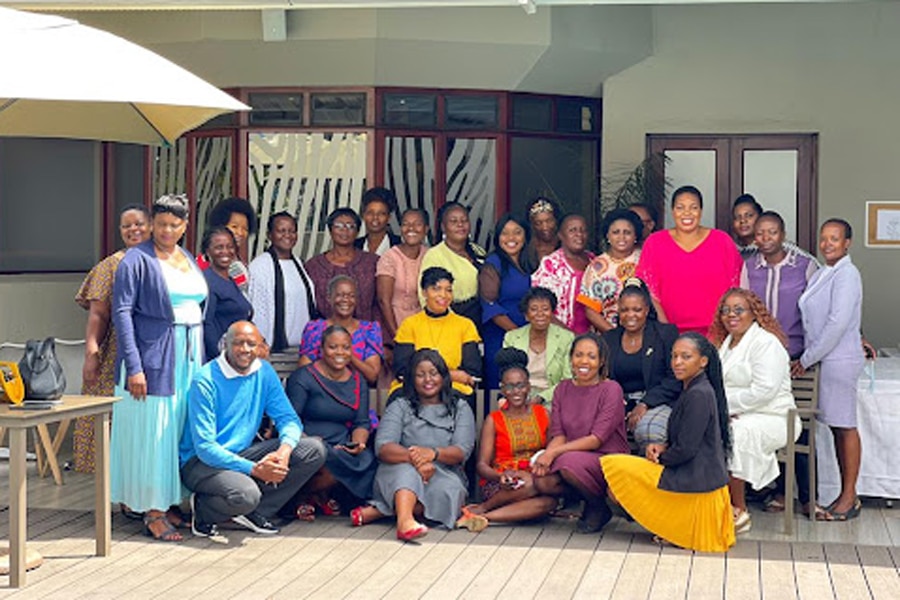
Goldin Global Fellow Nicholas Songora Odoll also provided an update on the critical work of the Manyatta Youth Entertainment (MAYE) in the coastal counties of Kenya to promote social accountability, civic education, and social justice using creative arts. Chicago Peace Fellow, Annette Kelly, also helped host a series of workshops on Violence Prevention in Chicago through her work with the Chicagoland Vaccine Partnership (CVP) in the communities hardest hit by COVID and violence.
The 2022 Chicago Peace Fellows also met for the first time to begin their Fellows Program; the launch brought together a powerful community of activists, artists, social workers, and community leaders representing 14 community areas on the South and West sides of Chicago.
May
Chicago Peace Fellows provided 300 Mother's Day bouquets to mothers who have lost their children to violence in Chicago, bringing comfort to families impacted by gun violence and raising support for peace building projects in Chicago to prevent these tragedies in the future.
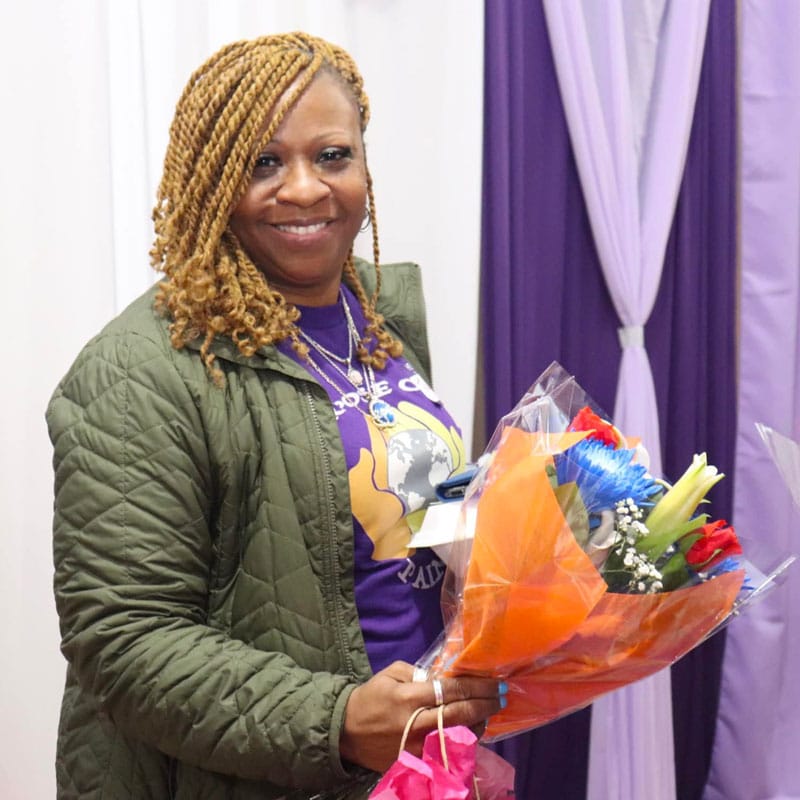
2018 Goldin Global Fellow Cynthia Luvlee shares an inspiring update from Shyne San Diego, sharing the principles that powered the exponential growth of the Shyne Survivor Business Network™ which recently enrolled its 50th survivor entrepreneur!
We also received an update from Global Fellow from Liberia, John Kamma, who worked in collaboration with Catalyst 2030 and his team to mobilize his community to improve health and sanitation and hosted a conversation on narrowing the "justice gap" in the Glass Factory neighborhood.
Mahdar Tahir, Goldin Global Fellow from Malaysia and founder of the Crescent Collective, shared his insights as a panellist for a discussion on religious freedom for which he spoke about the role of religious leaders in building social harmony.
June
In June we welcomed 14 grassroots leaders from around the world onto our 2022 Global Fellows Program! This is the third cohort embarking on the four-month program, where Fellows worked and learnt together as a Community of Practice.

The Chicago Peace Fellows Mutual Aid Collaborative held the Second Annual Concert for Peace at the Hatchery on June 4th, celebrating the artistic accomplishments of their communities and a shared commitment to improving their neighborhoods. The Mutual Aid Collaborative also worked to address an increased demand for blood from Black and Brown donors through holding the #OurBloodMatters blood drive as part of the ongoing project called The Safety Net.
Chicago Peace Fellows hosted a conversation at the Firehouse Community Arts Center on June 3 2022 to discuss community safety and crime data with the University of Chicago Crime Lab as part of the Mutual Aid Collaborative’s Civic Leaders series. This month, Chicago Peace Fellow Pilar Audain also partnered with theater company Collaboration to design and host Moonset Sunrise, a theatrical experience rooted in healing, self-care and collective growth through song, storytelling, dance and ritual.
To solidify and spread the benefits of the peace agreement in the Southern Philippines, Global Fellow Lo Ivan promotes the need to lean into the indigenous culture of volunteerism, known locally as "bayanihan", as a peace multiplier that shapes the Bangsamoro youth as proactive agents of peace, development, and social transformation.
July
In July we launched our first ever Global Fellows Program in Spanish! We welcomed 17 grassroots leaders and activists onto the program, who undertook the curriculum and engaged in the journey together in Spanish. These Fellows live and work in Argentina, Bolivia, Chile, Colombia, Haiti, Mexico, Spain, the United States and Venezuela.
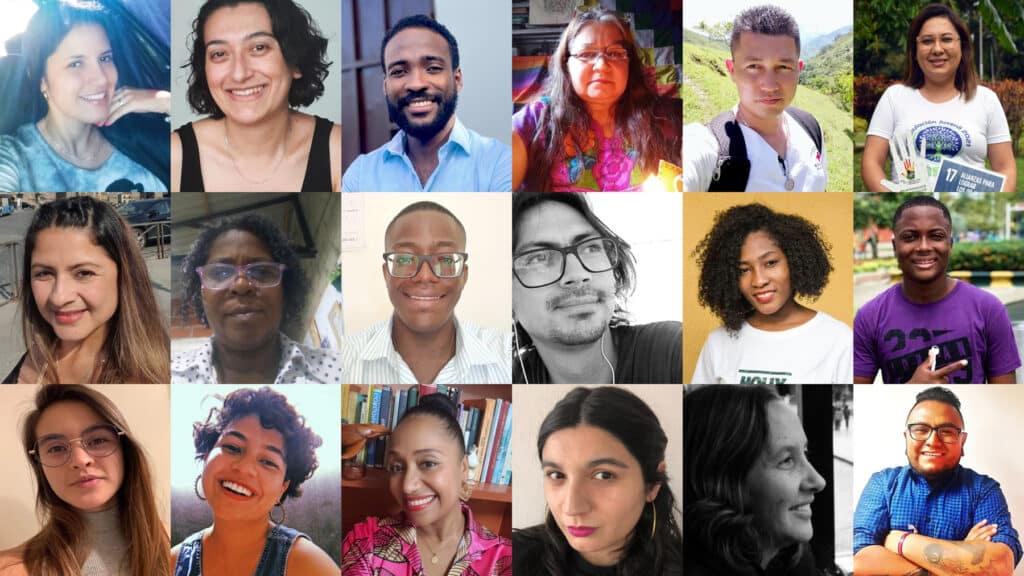
Chicago Peace Fellows Mutual Aid Collaborative hosted a Civic Partner Series conversation with University of Chicago Medicine Violence Recovery Team to learn about a unique public health model of violence interruption. And Global Fellow from Detroit, David Metler, provides insights into Swingset Activism and the idea of social justice education inspired by childhood. He proposes that we have much to learn from children who can help us integrate our activism into our lives and embrace the elements of playfulness, joyfulness, loving-kindness, presence, creativity, and our capacity to re-imagine what is possible.
August
The Chicago Peace Fellows Mutual Aid Collaborative this month carried out two activities. They launched the Safety + Cycling Team to tackle violence which occurs during road and traffic accidents, by providing bike helmets and safety tips at community events.
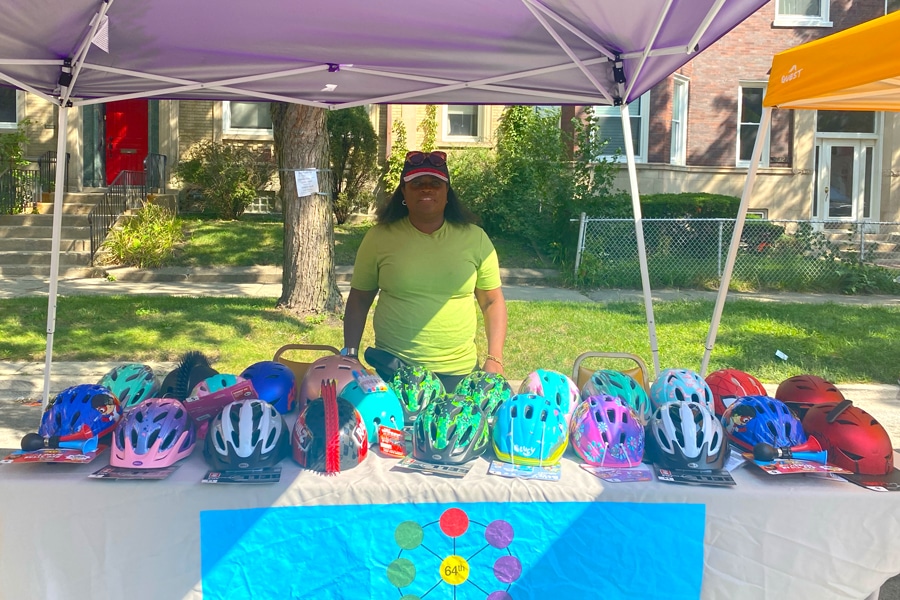
The Mutual Aid Collaborative also hosted a conversation with Dr. Andrew Papachristos to build connections and learn how the science of social networks can be used to understand and target support to people at the highest risk of becoming a victim of gun violence.
2019 Chicago Peace Fellow, Pastor Robert Biekman, piloted a Community of Practice utilizing the GATHER Platform to foster peer-to-peer learning amongst newly ordained pastors with the Evangelical Lutheran Church of America (ELCA). And Global Fellow from Argentina Diana Rocio Gomez Torres, explored the emergence of social movements across South America and bring visibility to the history and memory of these strategies of practical and symbolic resistance.
September
In September, our Fellows around the world embarked on several peacebuilding projects in honor of International Day of Peace 2022. These activities included: The launch of an apprenticeship program for Children Born of War in Uganda, using soccer to promote peace and reconciliation in Colombia, creating a new generation of youth leaders working on peacebuilding in Israel, Freestyling for social change in Colombia, and Peace Day activities from three Global Fellows in South America.
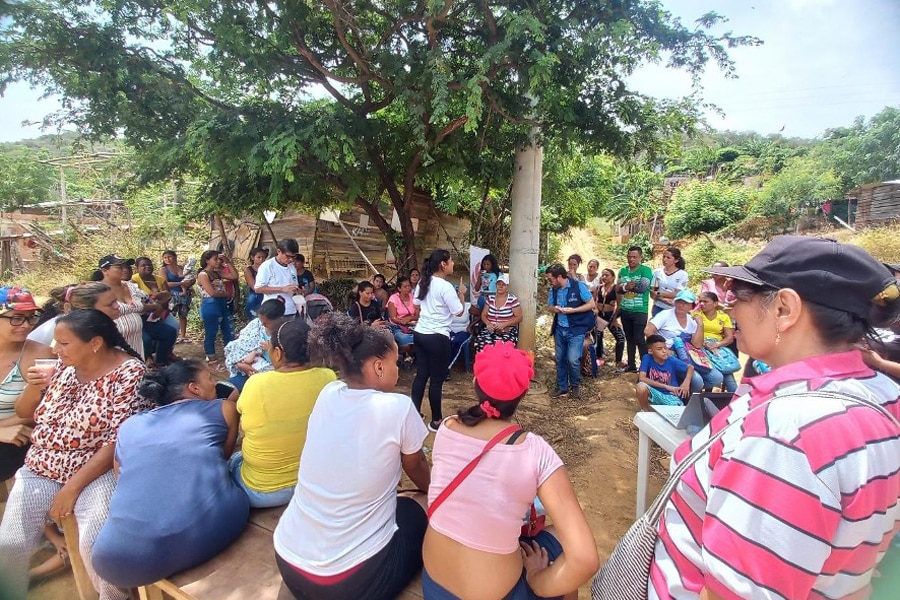
This month we also saw the graduation of the 2022 Chicago Peace Fellows! After embarking on a five-month learning and sharing journey together, their achievements were celebrated at the Chicago History Museum.
October
This month the Goldin Institute turned 20! For the past two decades the Goldin Institute has adopted an approach which is grassroots-led and embedded in kindness, compassion and learning, from everyone but most especially those closest to the issues. We promote the voices of those excluded voices who often have the most at stake in making progress and ensure that they have leadership roles in every social change movement. Which is why it is extremely exciting to celebrate 20 years of the Goldin Institute.
The Chicago Peace Fellows Mutual Aid Collaborative also launched Generation NOW, an idea conceived by Messiah Equiano, a 2021 Chicago Peace Fellow, which will provide opportunities for young people to write and produce a teen talk show addressing everyday issues that teenagers face. We also celebrated the Chicago Day of the Girl with Chicago Peace Fellow La’Keisha Gray-Sewell’s organization (Girls Like Me, Inc) hosting an event to both celebrate Black girls in the city and ensure their sense of belonging.
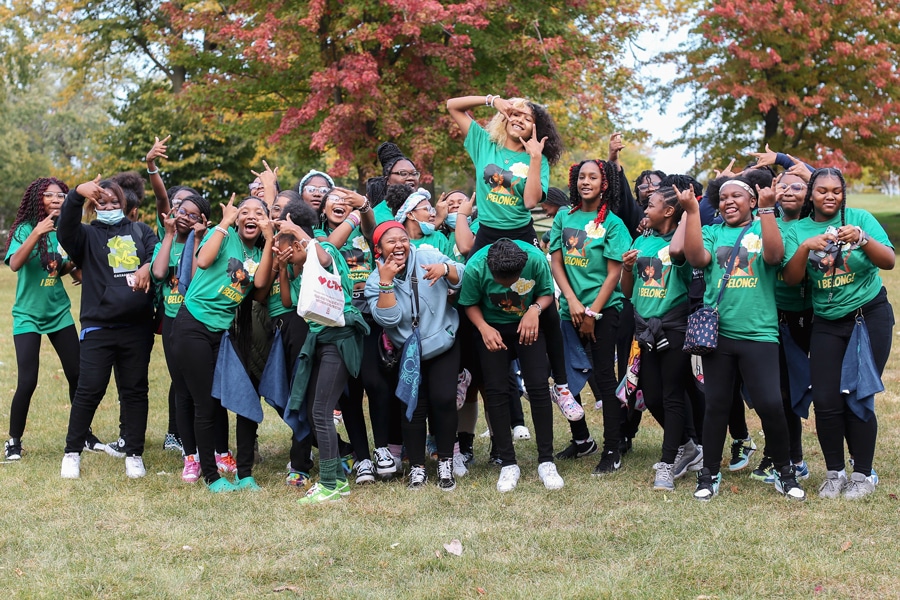
The first annual Sukkah Design Festival was also held this month, on October 9-16, showcasing North Lawndale’s Jewish history and providing social services to the community. Reshorna Fitzpatrick, 2019 Chicago Peace Fellow and Executive Pastor of the Stone Temple Baptist Church, was a member of the organizing committee, which included both community-based organizations and design firms.
November
Our 2022 Global Fellows (English-language cohort) graduated from the Gather program! At the graduation ceremony on 4th November, the 2022 Fellows demonstrated their achievements and shared their aspirations, recognizing how much stronger they now are together.
Global Fellow Oluchi Uzodimma from Nigeria also provided an update on the devastating impact of the recent flooding in Nigeria which has displaced more than 2 million people and damaged over 200,000 homes.
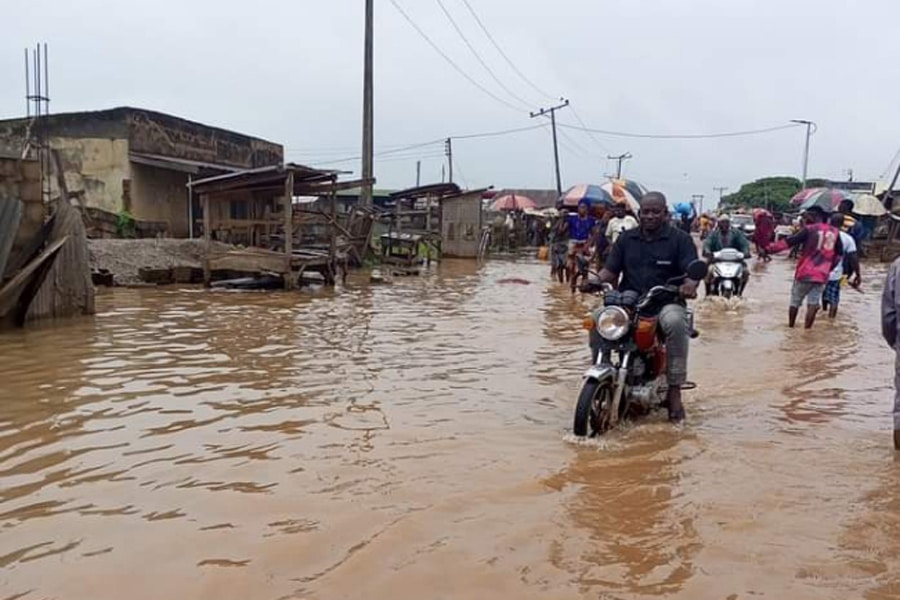
December
As we wind down to conclude the year, we were honoured to celebrate the achievements of the first Spanish-speaking cohort at their graduation ceremony on December 10th. The ceremony included performances in the form of song, freestyling, music, and poetry and reflected on what the Fellows had achieved, individually and collectively.
We remain humbled and honoured by the achievements of our global network of Fellows and we have much to be thankful for, especially the support of our global network of friends and colleagues. We would like to give a special thanks to all our sponsors and supporters for ensuring our leaders were able to continue their much-needed activities throughout the year.
Celebrating the 2022 Chicago Peace Fellows Graduation
By Jamika Smith, Tina Gulley-Augustus, Don Williams, Jacqueline Williams, and Cree Noble
On September 29th, 2022, 14 grassroots leaders from across Chicago gathered at the Chicago History Museum to celebrate their achievements as the fourth cohort to graduate in the Chicago Peace Fellows program.
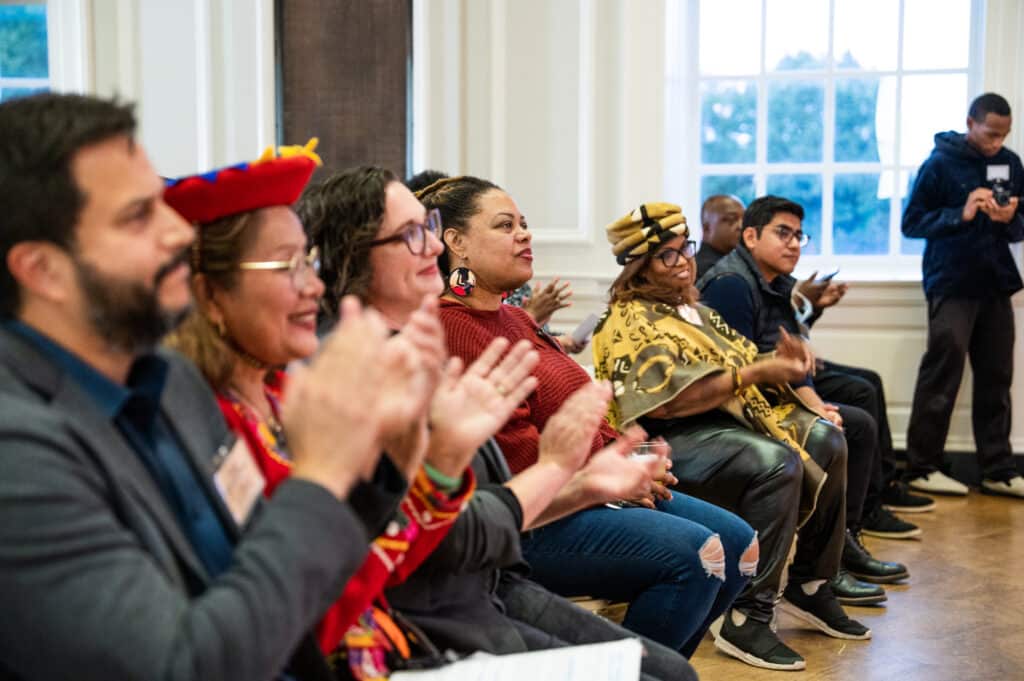
The Chicago Peace Fellows (CPF) program spanned over six months with over 25 workshops, partnership meetings, and discussions that helped Peace Fellows to deepen their shared understanding of grassroots leadership, violence prevention and community driven social change.
“Some of the greatest learning experiences were the collaboration of the Peace Fellows in developing community asset maps and recognizing how rich our communities look when we viewed them from an asset standpoint instead of a deficit. Our communities are so rich in knowledge, resources, and talents.” -- Tina Gulley Augustus, 2022 Chicago Peace Fellow
This was the second year that the Chicago Peace Fellows Graduation was hosted at the Chicago History Museum. The space was filled with laughter, cocktails, hors d'oeuvres, and music by a performance from a youth band from Segundo Ruiz Belvis Cultural Center playing Caribbean Jazz. The balcony gallery, just before you enter the great hall, was lined with pictures of the 2022 Peace Fellows. The gallery is named after the late Mrs. Josephine Baskin Minow, a community organizer, and advocate, who fought for many years for social justice and equal rights, to improve the quality of life for others much like the Chicago Peace Fellows.
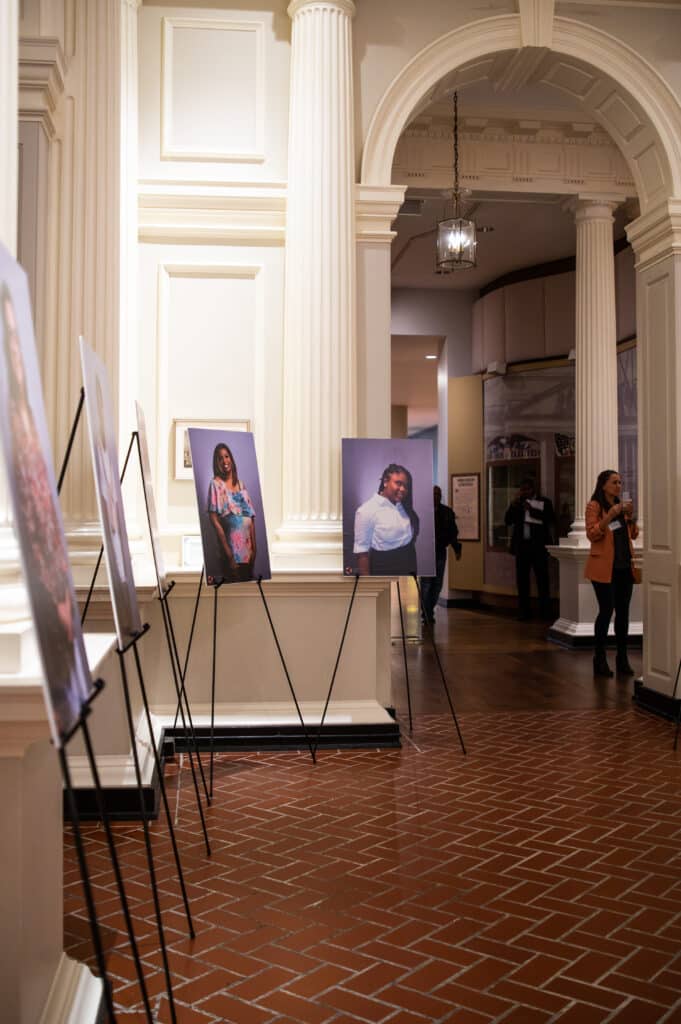
The graduation program was created by the Fellows to highlight their experiences, learnings and accomplishments. They incorporated personal testimonies, group facilitation, spoken word, asset mapping, and interactive programs into the design of the agenda. These activities were chosen due to the influence they had on each Fellow and how they allowed us to connect to our communities, family, and friends who were all in attendance at the graduation ceremony.
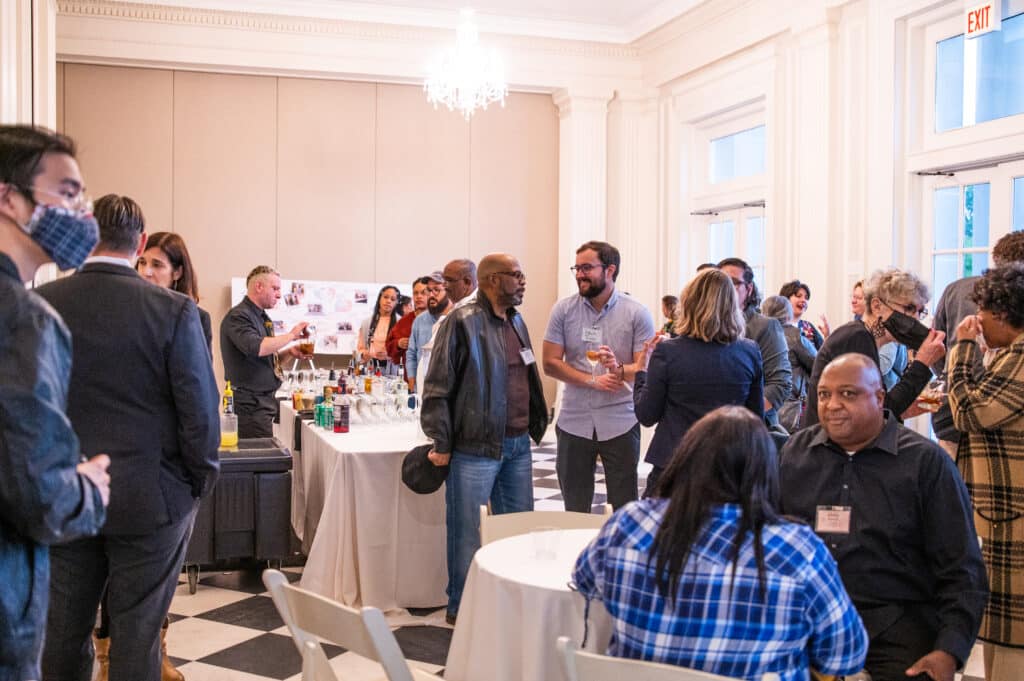
The ceremony began with a welcome remark from the Director of the Chicago Peace Fellows, Burrell Poe, who spoke about the impressive effort, work and conversations this group of fourteen leaders had undertaken over the past five months. Following Burrell, Fellow Lindsey Joyce opened the space with a prayer and reflection. After this opening reflection, Chicago poet Brynn Baltimore offered a powerful spoken word piece performance. The fourth speaker was CPF Don Williams, who provided a personal testimony about the loss of his son and how he had turned pain into purpose.
“My tribute to my son Deon J. Williams left me with a lot of mixed emotions about March 9, 2019… getting up there speaking about it brings some comfort and steps of me getting some closure. Deon was my baby. I wish things would have been different that day and that he would still be here. But that is why I started the Deon J. Williams Foundation, so that I could bring some awareness to juvenile law to change. I want to give a special thanks to my newfound family, the Peace Fellows. Thanks for allowing me to share my story. I hope I can impact someone.” - Don Williams (2022 Chicago Peace Fellows)
After Don’s powerful testimony, all 2022 CPF joined on stage to introduce themselves and the community they serve, and answer the question: “If violence disappeared tomorrow, what would be possible in my neighborhood?”, group presentation which was led by 2022 CPF Syliva Del Raso. Once the Fellows had shared their answers, they invited the audience to contribute to the question by writing it on a sticky note and placing it on a poster board.
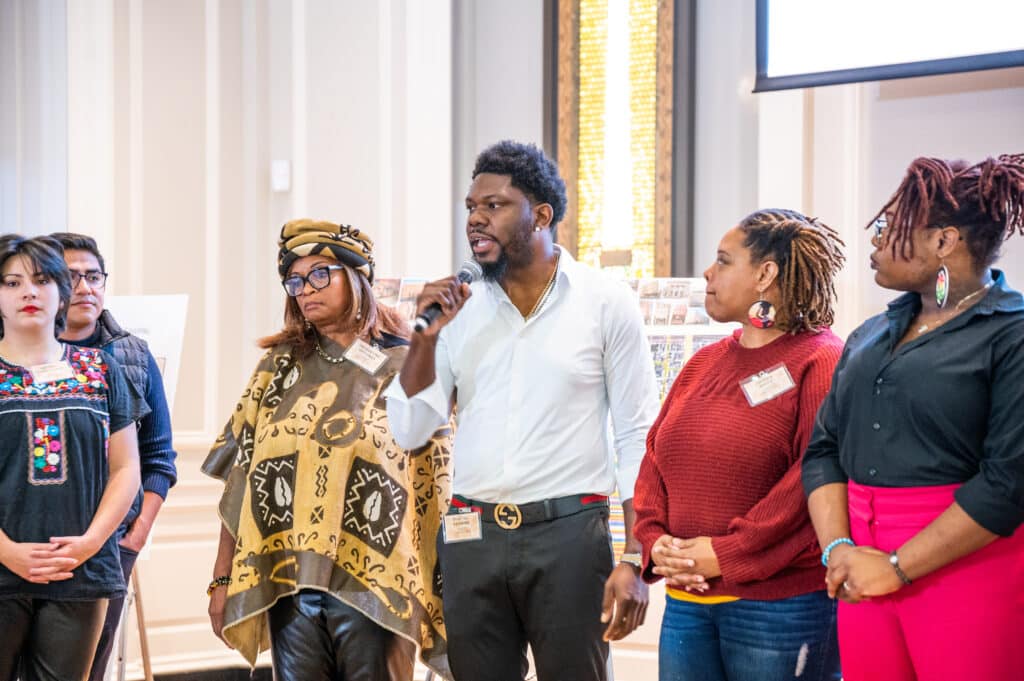
The second part of the ceremony was an explanation and presentation of what asset maps were. Fellows presenting their asset maps included Maria Pike (representing Pilsen), Edwin Martinez, and Sylvia Del Raso (representing Little Village), and Jackie Williams, Jamika Smith, Xochtil Hubbell-Fox, and Tina Gulley-Augustus (representing Austin).
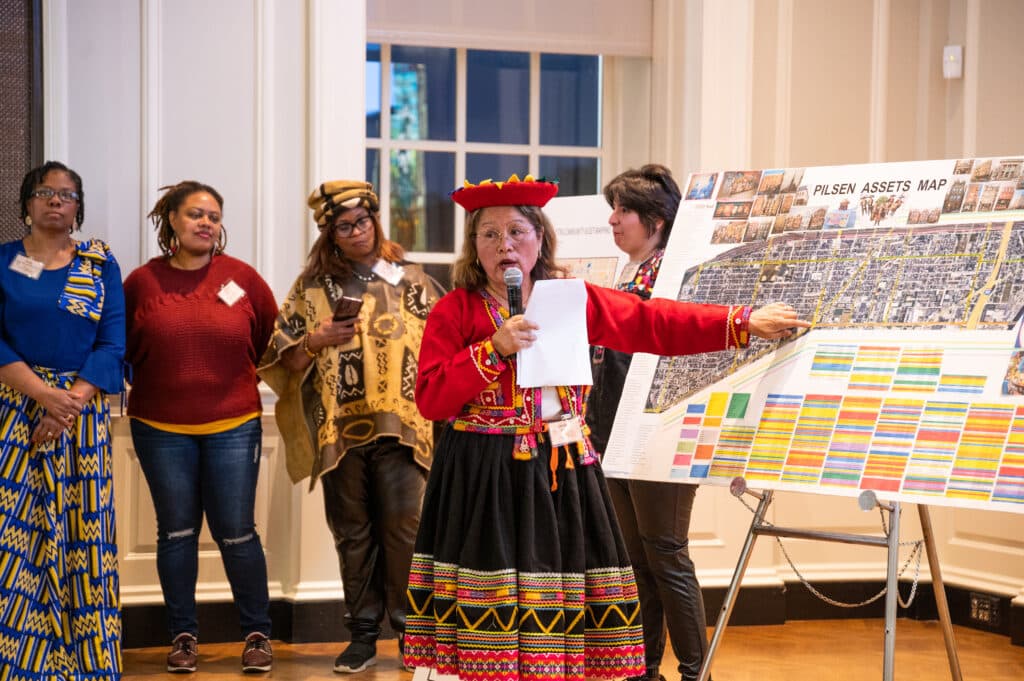
Then CPF Pha’Tal Perkins and CPF Edwin Martinez made closing reflections on what they hope to accomplish as they put their new learnings into practice. Lastly, Jamika Smith unveiled a project she wanted to gift to the 2022 Chicago Peace Fellows.
"Because I gained so much from the overall experience, my Spirit moved me to return the favor by sharing with my cohort and the Goldin Institute leadership a little piece of my heart. I took a skilled craft that has been around since the Middle Ages and I metaphorized it -- did I just make up a word? My cohort and I took an old worn-out chair and told our story, addressing the question “If violence disappeared tomorrow, what would be possible in my neighborhood?” One by one, we discussed the challenges, barriers, and limited beliefs our neighborhoods are struggling with today. Next, I asked them to share with me, if violence was rid from our communities tomorrow how would you feel? And what image and color will represent that feeling for you? After gathering all 18 responses I incorporated them into a design that represented the voices of our 2022 Chicago Peace Fellows. Our Peace Chair will always be an attribute of our journey together. My goal is to take our peace chair on tour in 2023, giving each Peace Fellow the opportunity to house it for a period of time in their organization, as a reminder that we are all connected and still have work to do…Together!” - Jamika Smith (2022 Chicago Peace Fellow).
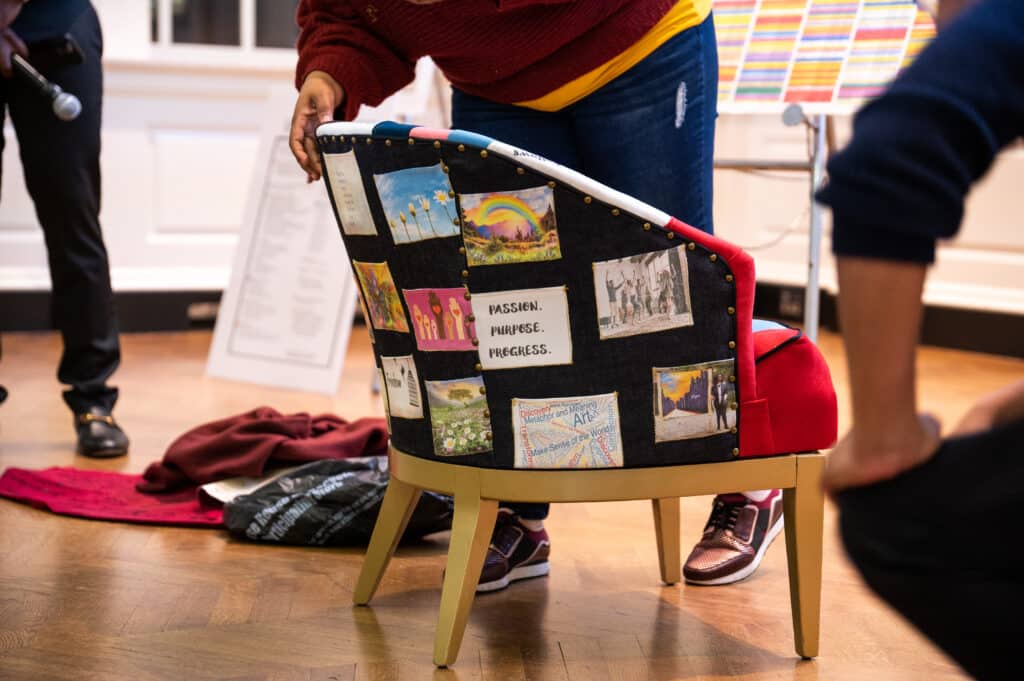
Upon graduation, the 2022 Chicago Peace Fellows now join the Goldin Institute’s Global Alumni Network which consists of over 150 Fellows from over 40 countries around the world. 2022 Chicago Peace Fellows Jacqueline Williams says “I plan to continue to stay in touch with as many people as possible. I have really enjoyed talking and connecting with everyone!
A December To Remember: Mutual Aid Collaborative Organizes a Toy Drive
By Michael Henderson, Director, Mutual Aid Collaborative
Juliet Jones, a 2021 Chicago Peace Fellow Alumni and the Co-Founder and Director of The Original Sixty Fourth Street Drummers, Inc. “wanted to bring children back to play” due to the set back and effects COVID-19 had on kids during the holidays. She thought holding a toy drive to benefit children in under-served communities would be a good way of accomplishing this goal.
Juliet, passionate about making a difference for children, proposed The Universal Toy Drive to the Chicago Peace Fellows Mutual Aid Collaborative. The Mutual Aid Collaborative consists of 60 Black and Brown leaders and committed allies who live and work in the communities they serve on the South and West sides. They have raised over $100,000 to support several active projects, including The Universal Toy Drive.
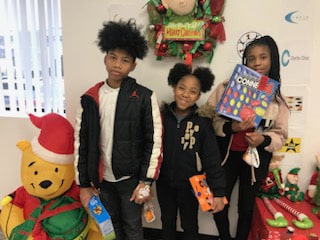
Juliet organized the Universal Toy Drive along with Dr. White, the TEECH Foundation, Clarity Clinic and Bethany Union Church to bring toys to disadvantaged children on the Southside of Chicago. Members from The Mutual Aid Collaborative, including Cosette Nazon-Wilburn of the LUV Institute, Jamila Trimuel of Ladies of Virtue, Gloria Smith of the Black Star Project, and Margaret Murphy-Webb of the Southside Jazz Coalition, all came together as a community to support Juliet. These leaders organized quickly by sharing flyers, sending and processing invitations, and reaching out to their network of parents.
On December 21, 2022, the Universal Toy Drive became a safe space for 113 children to play and receive gifts. The Universal Toy Drive was more than just giving toys away. Juliet knew the children who would be at the toy drive “normally missed out on a lot of things, not just toys, toys were the medium.” It was the intent of Juliet and the Mutual Aid Collaborative to bring joy to the lives of the under-served children and provide them with an opportunity to be kids.
Juliet was overwhelmed with joy as she got an opportunity to witness a village of children from a variety of places. Families who are dealing with HIV, children from the foster care system, children whose parents are incarcerated or in recovery, and other children from the community received all sorts of different toys, gift cards, coats, and other bags of goodies.
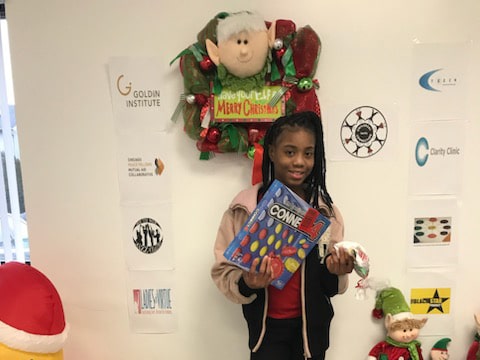
The 113 guests with their families that attended The Universal Toy Drive played board and video games, watched YouTube videos, played hopscotch and jump rope. They drank apple cider, hot chocolate, ate cookies and took pictures with Santa. The energy in the room was so amazing and filled with joy that the children received their gifts but, “didn't leave, they stayed and played, it was great”.
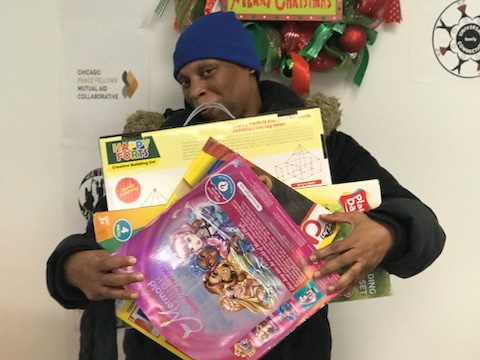
The collaborative efforts to touch the lives of children went beyond the imagination of Juliet’s and the village of local leaders. The Universal Toy Drive was a great success, providing 113 children with toys and gifting additional toys to The Universal Family Connection to use in their playroom for foster children. Juliet is ready for 2023 and has plans to continue to collaborate and organize with other community organizations to hold another Universal Toy Drive.
